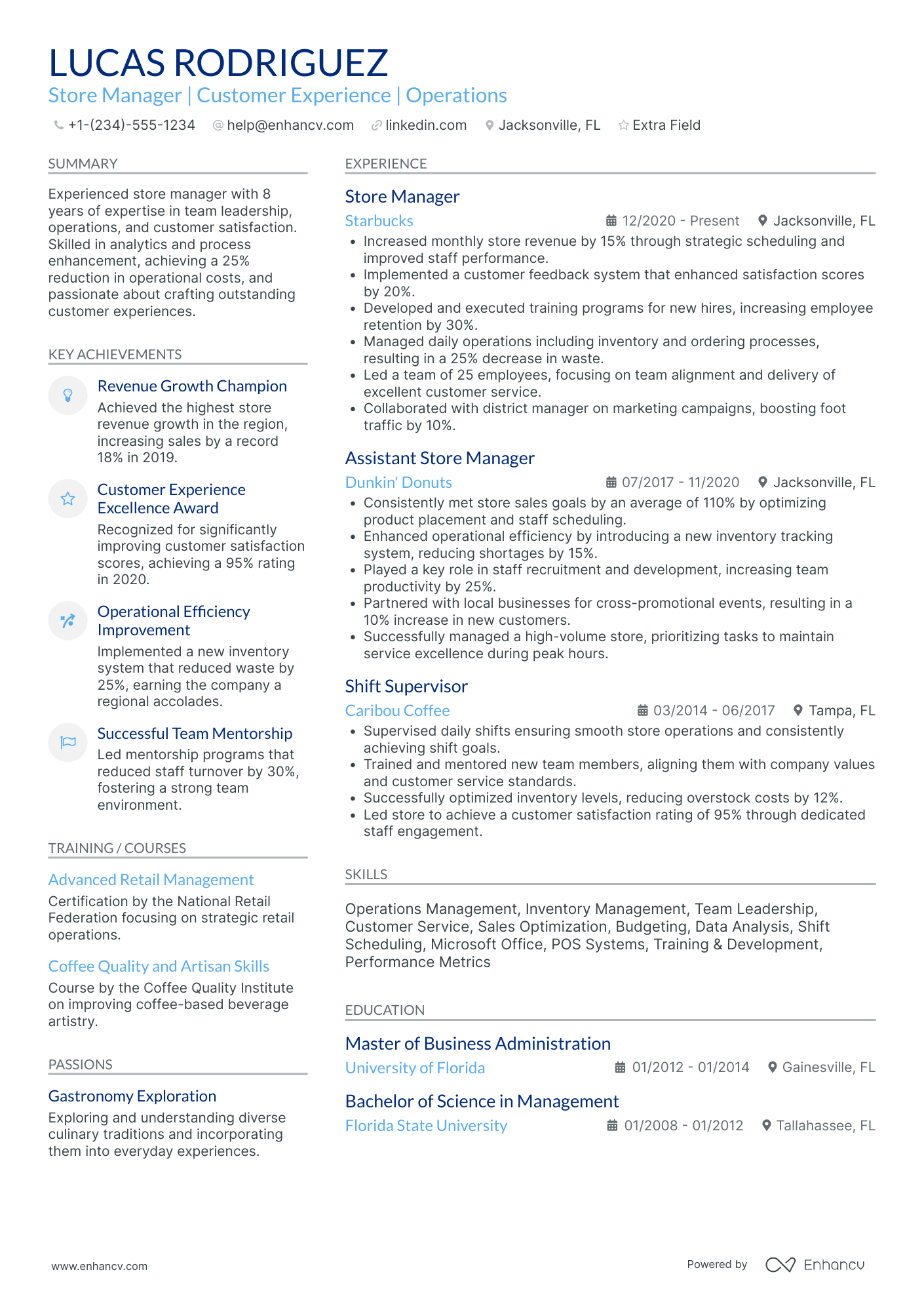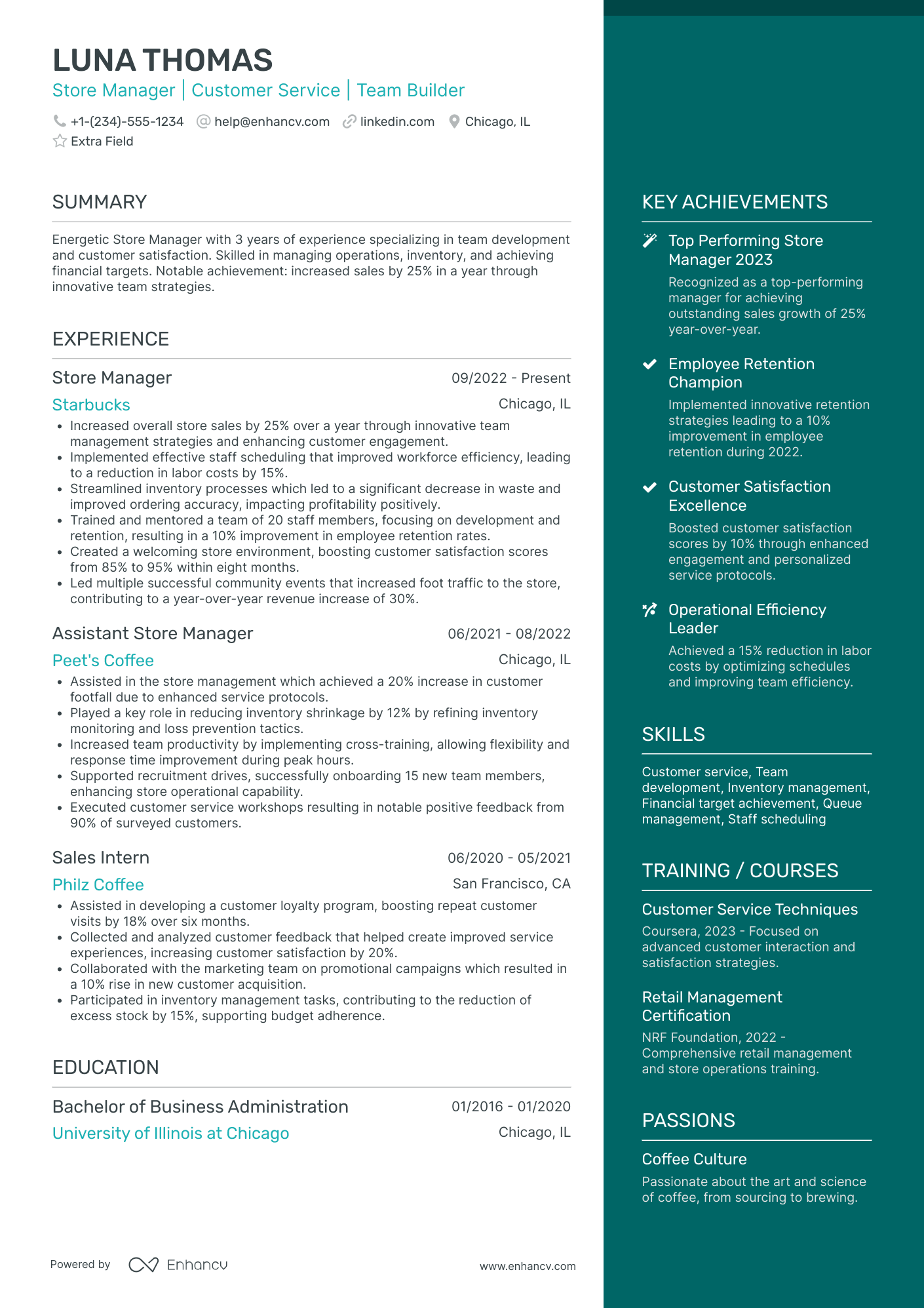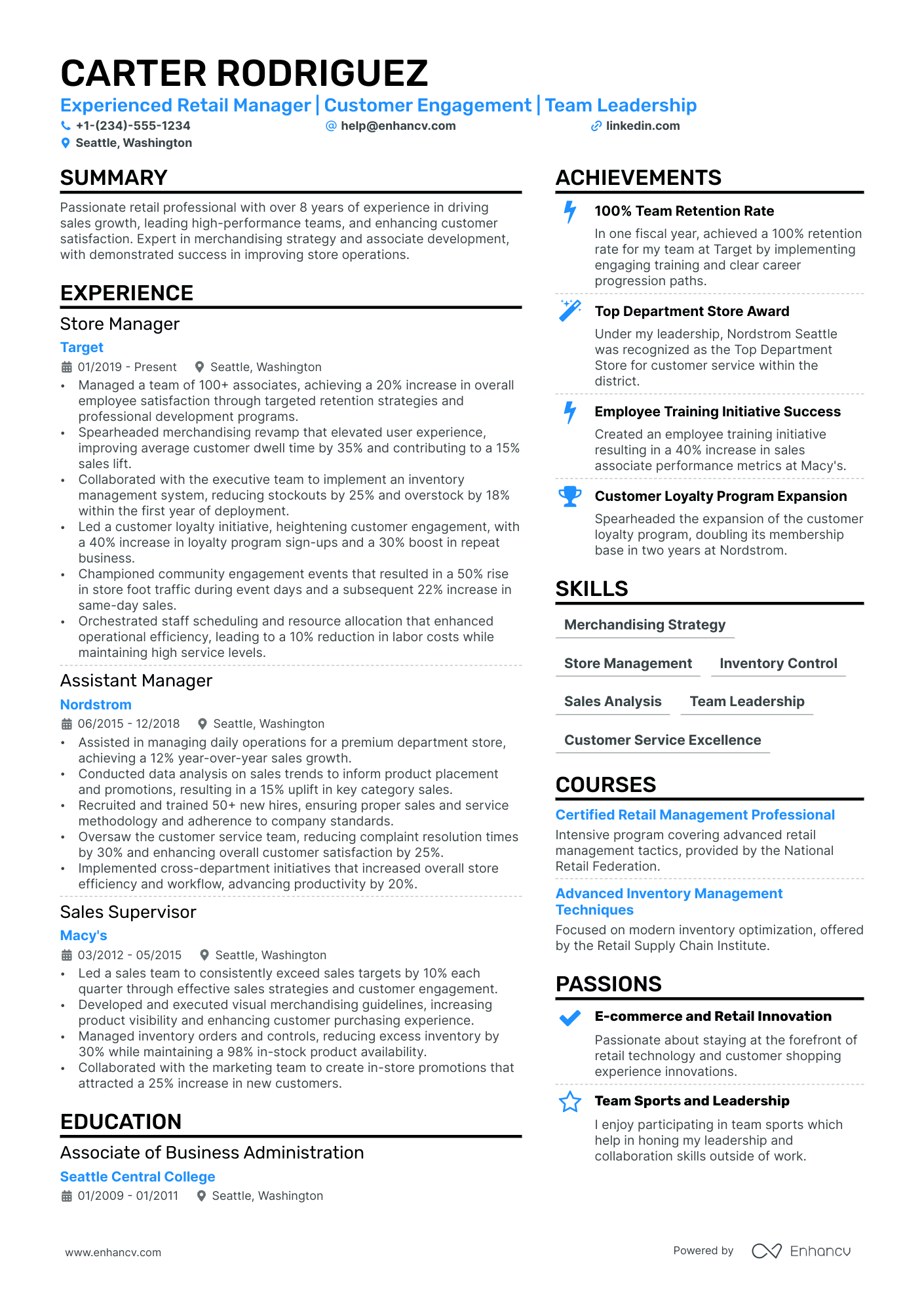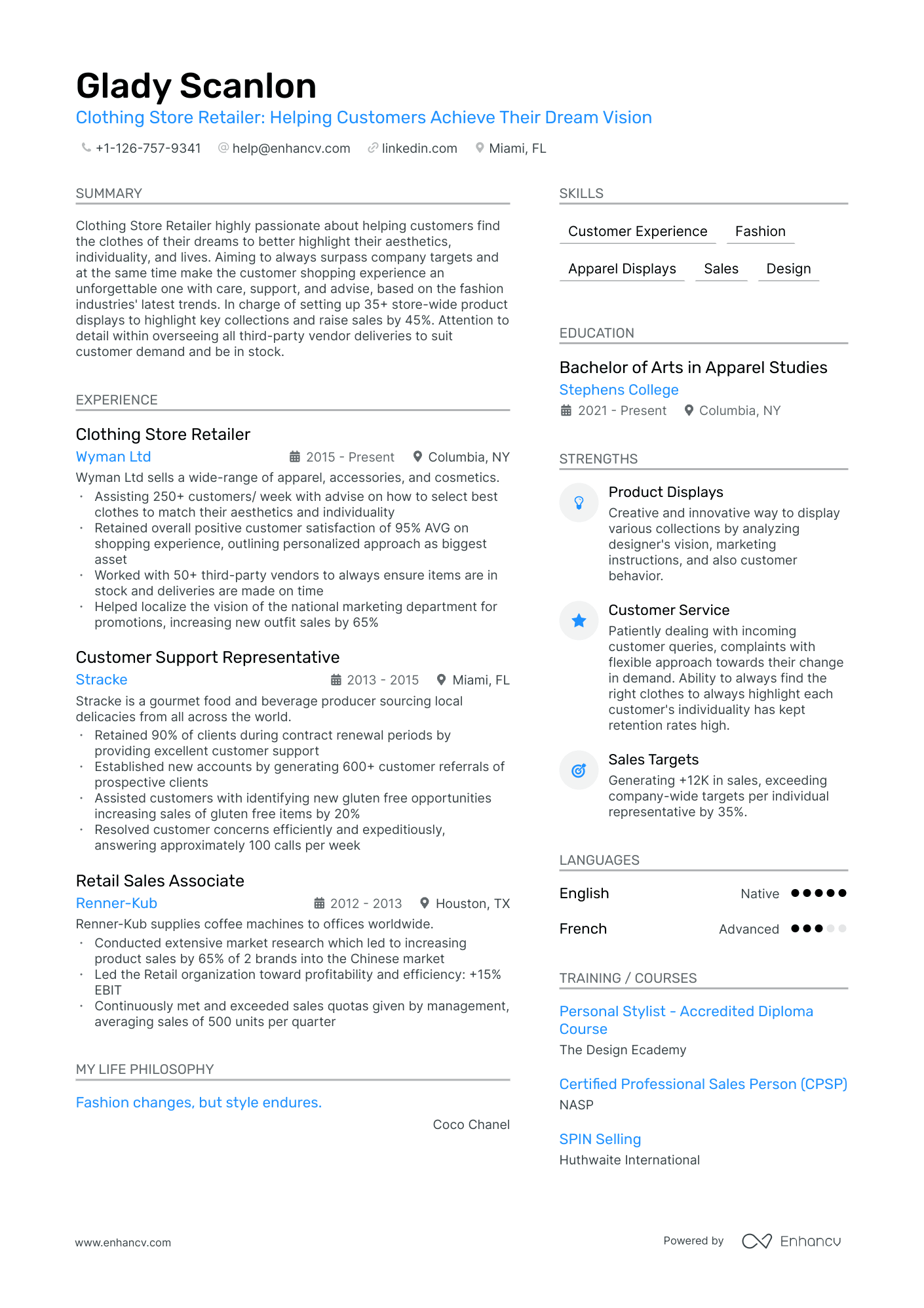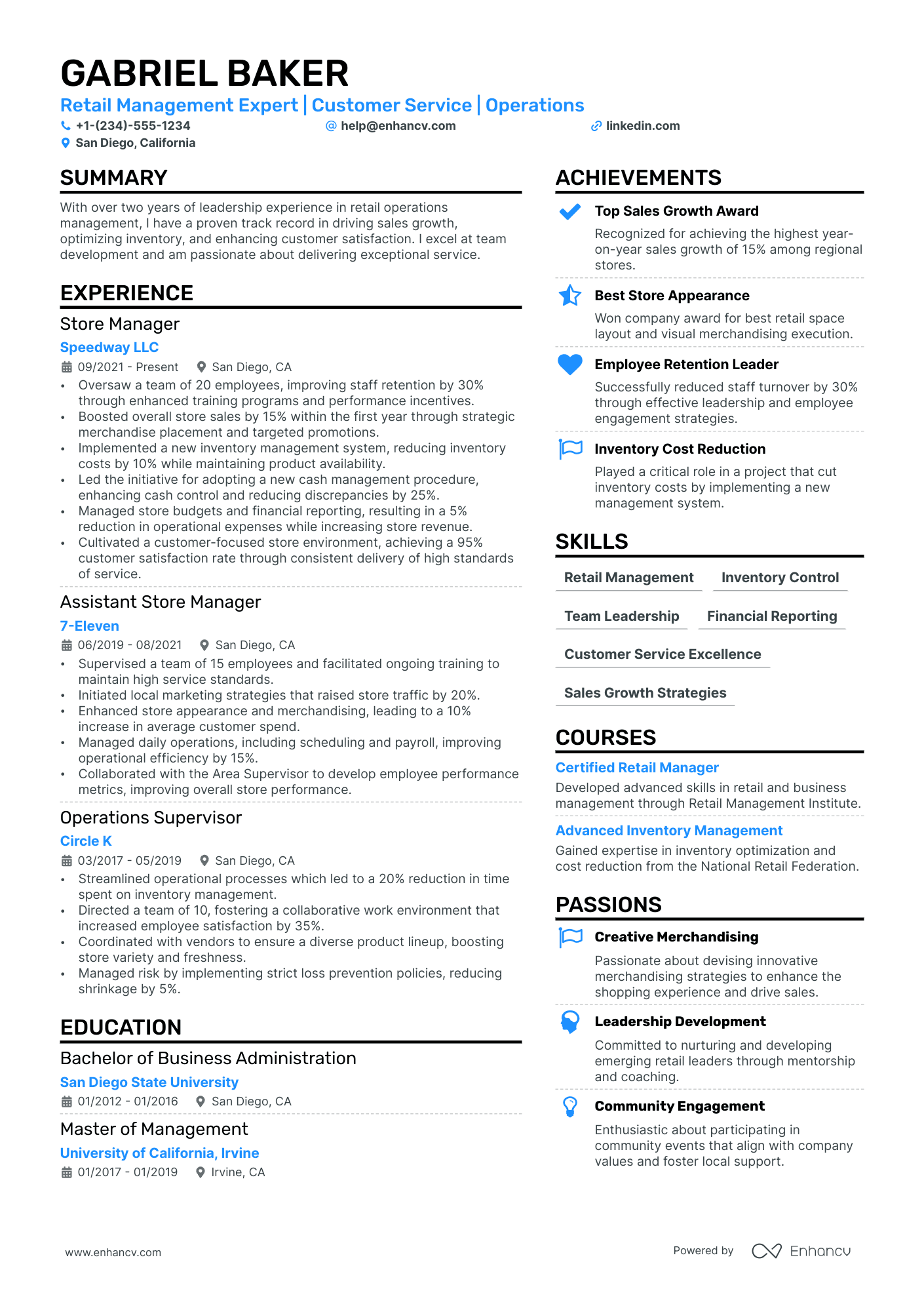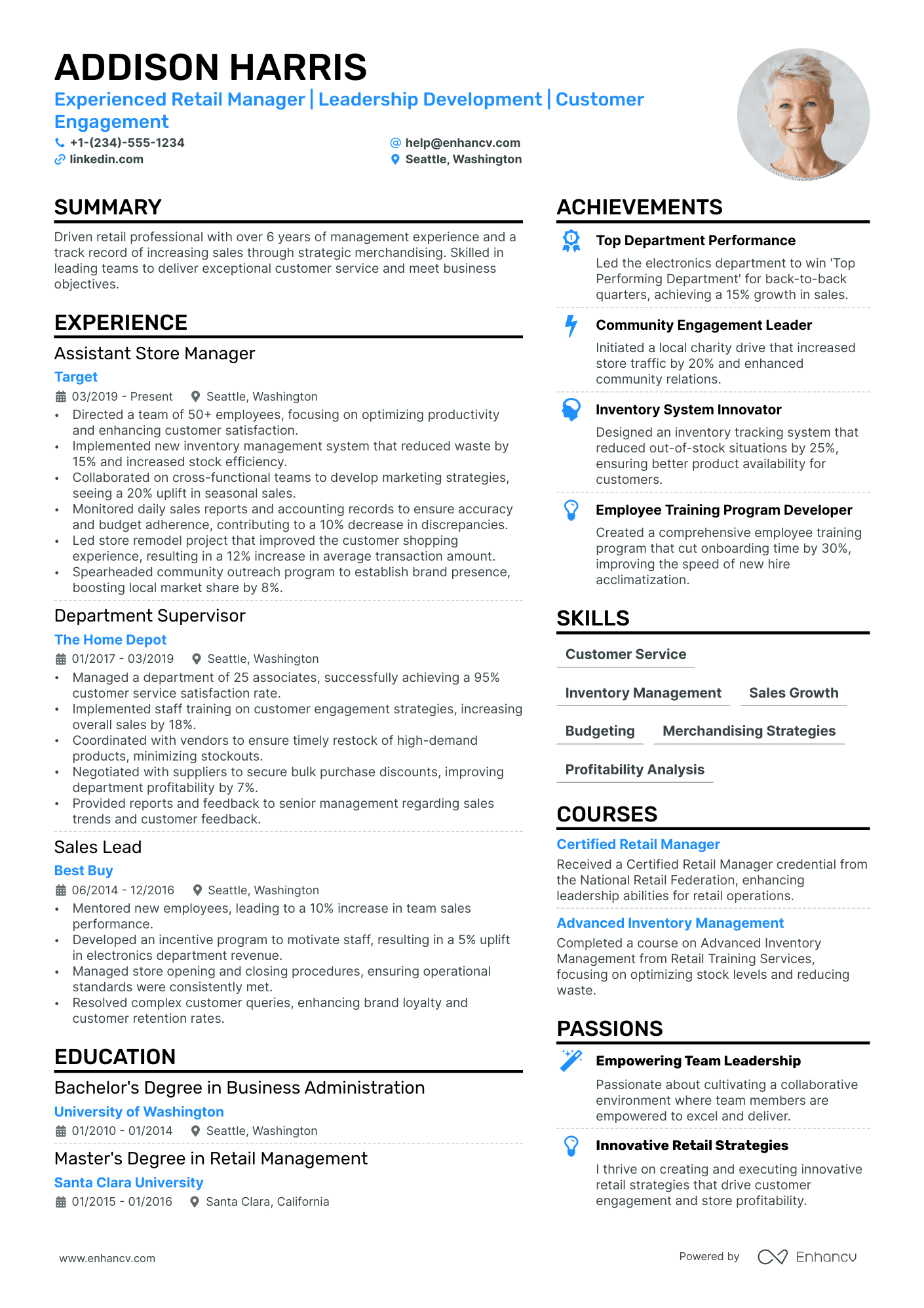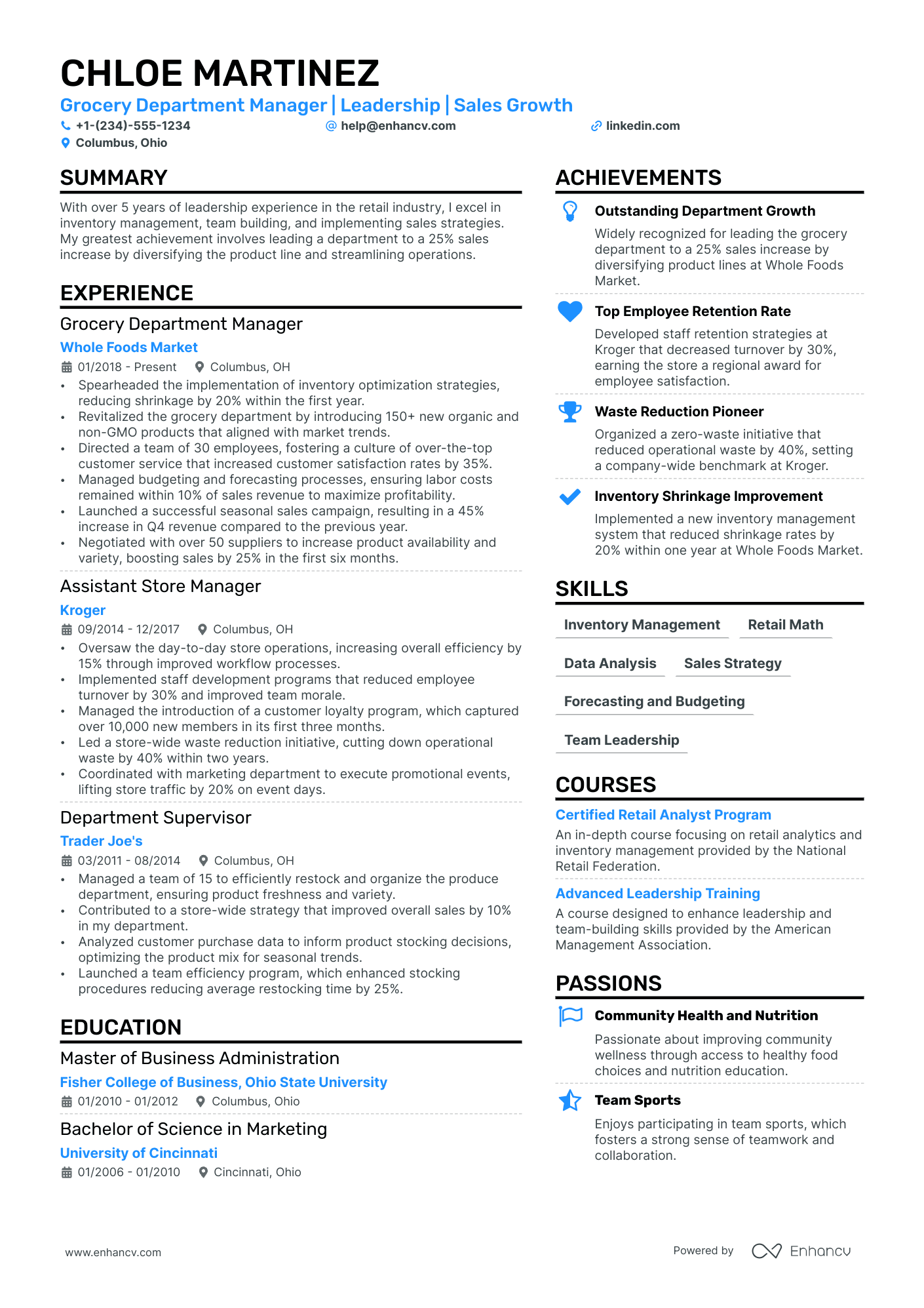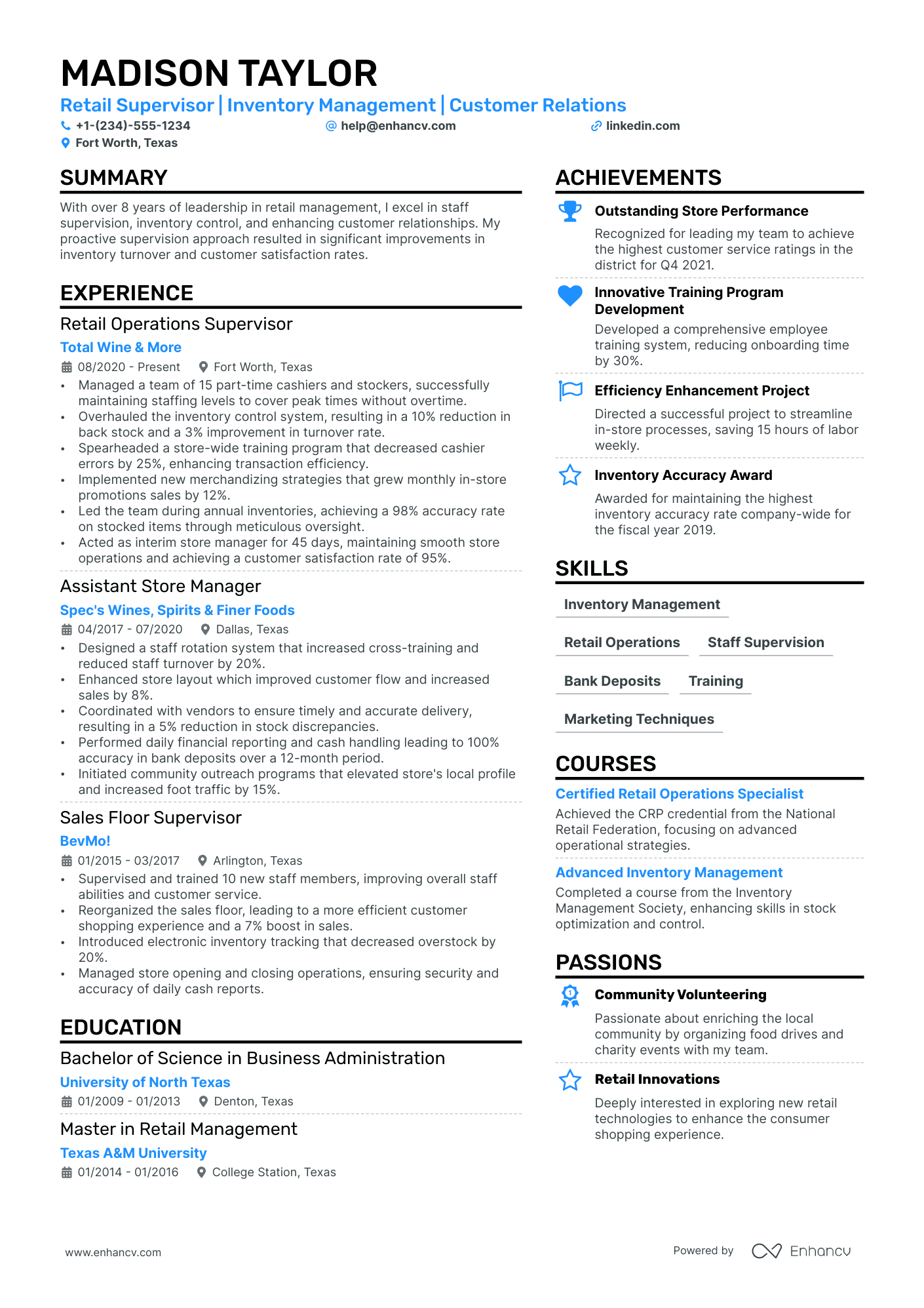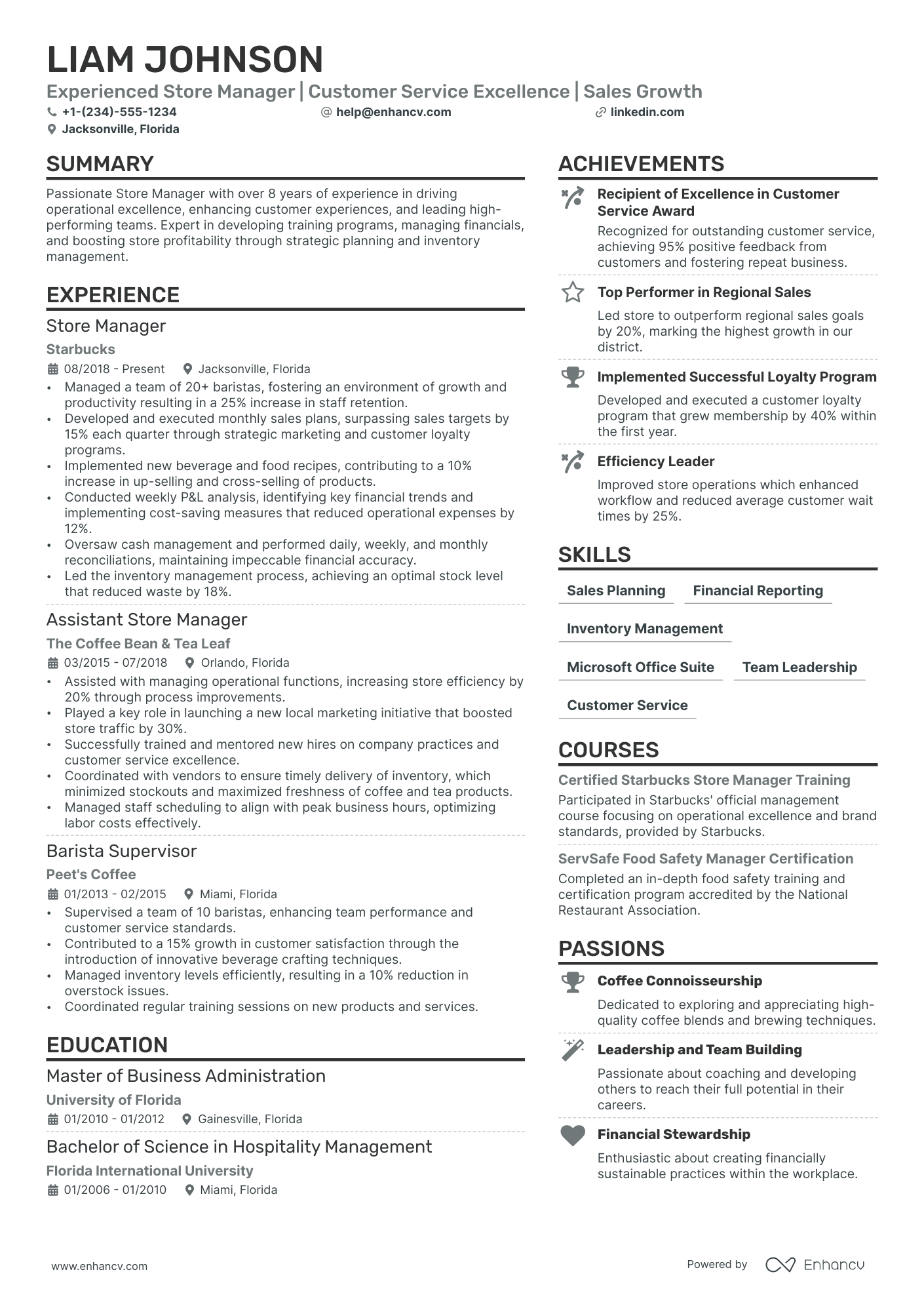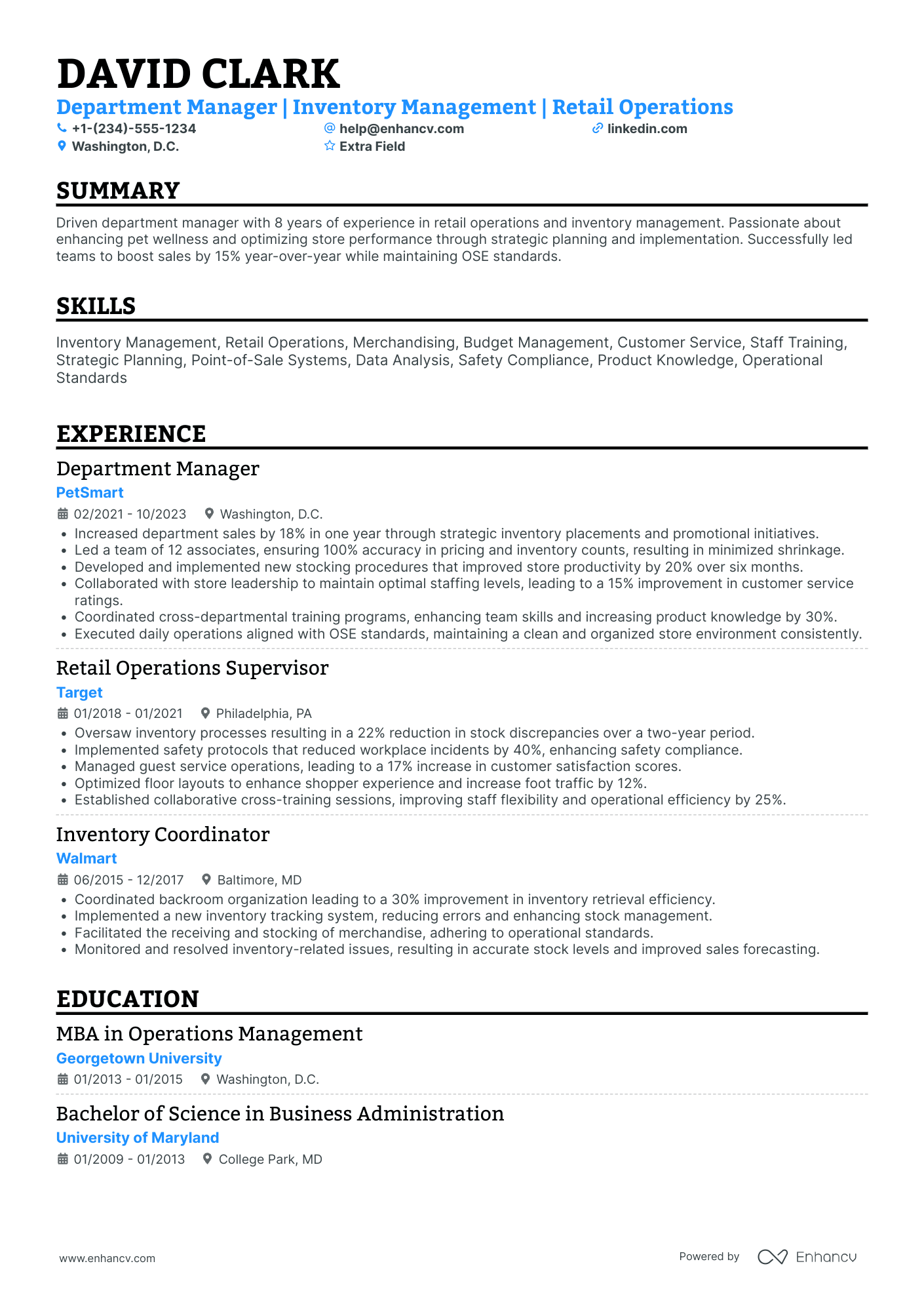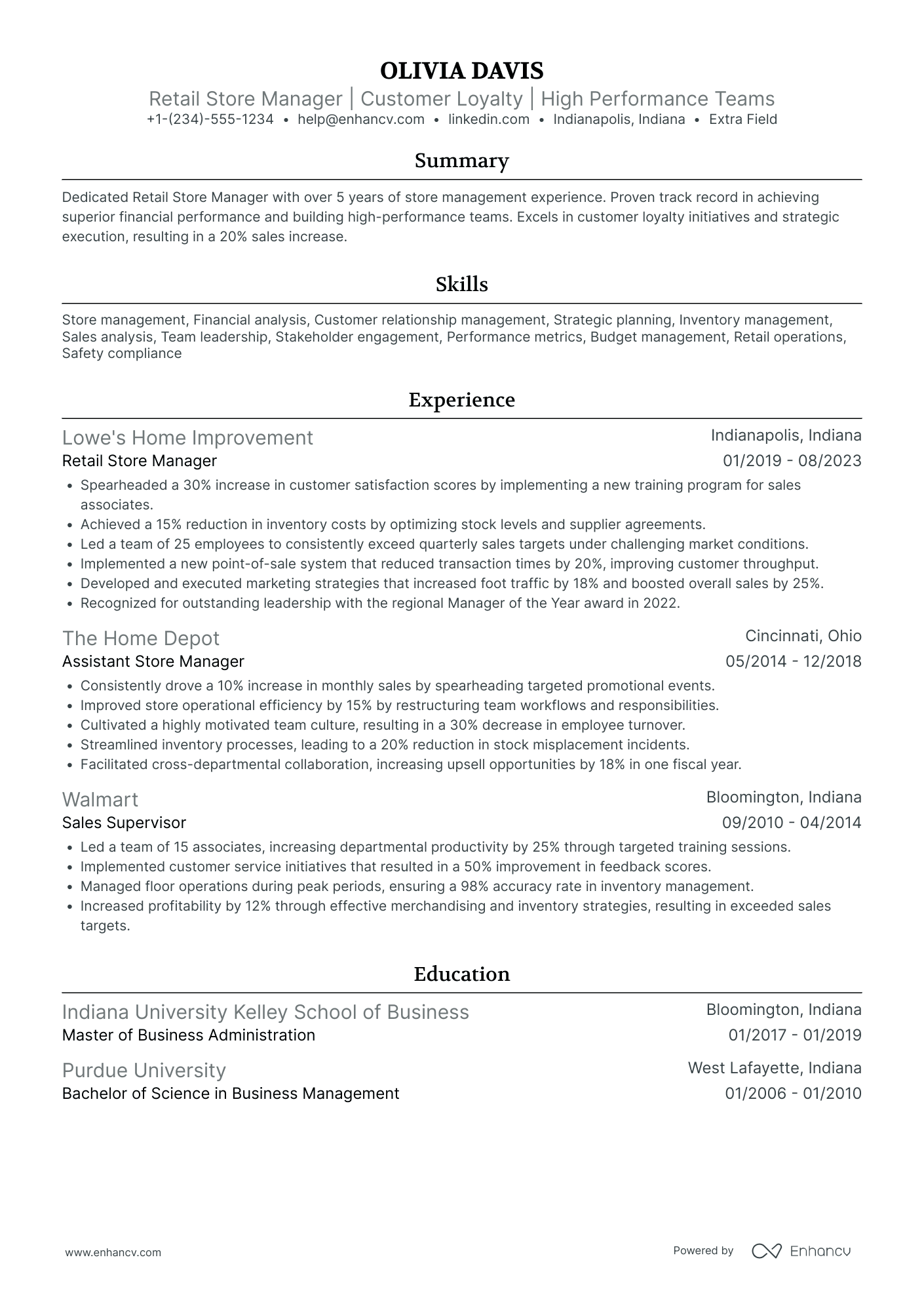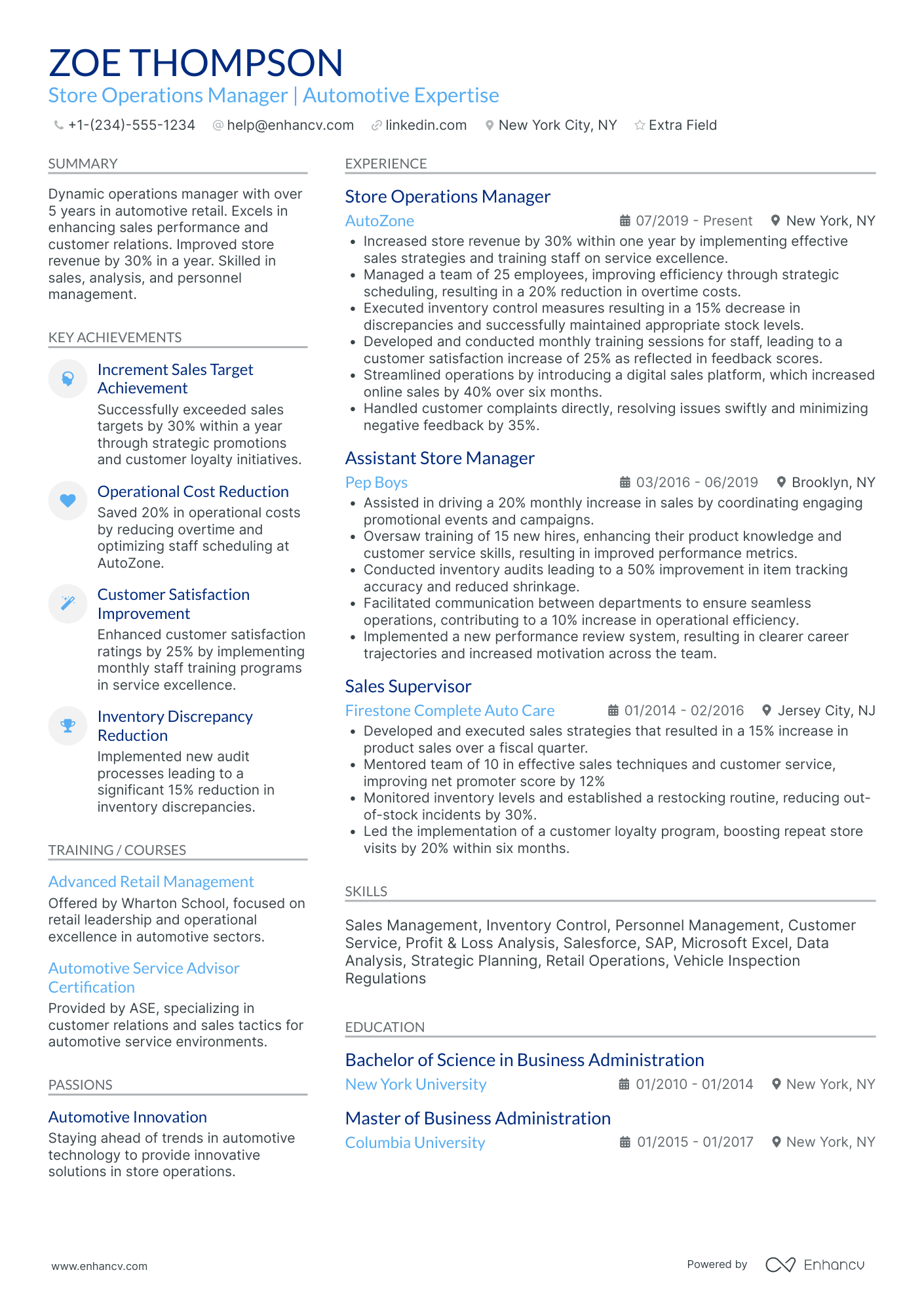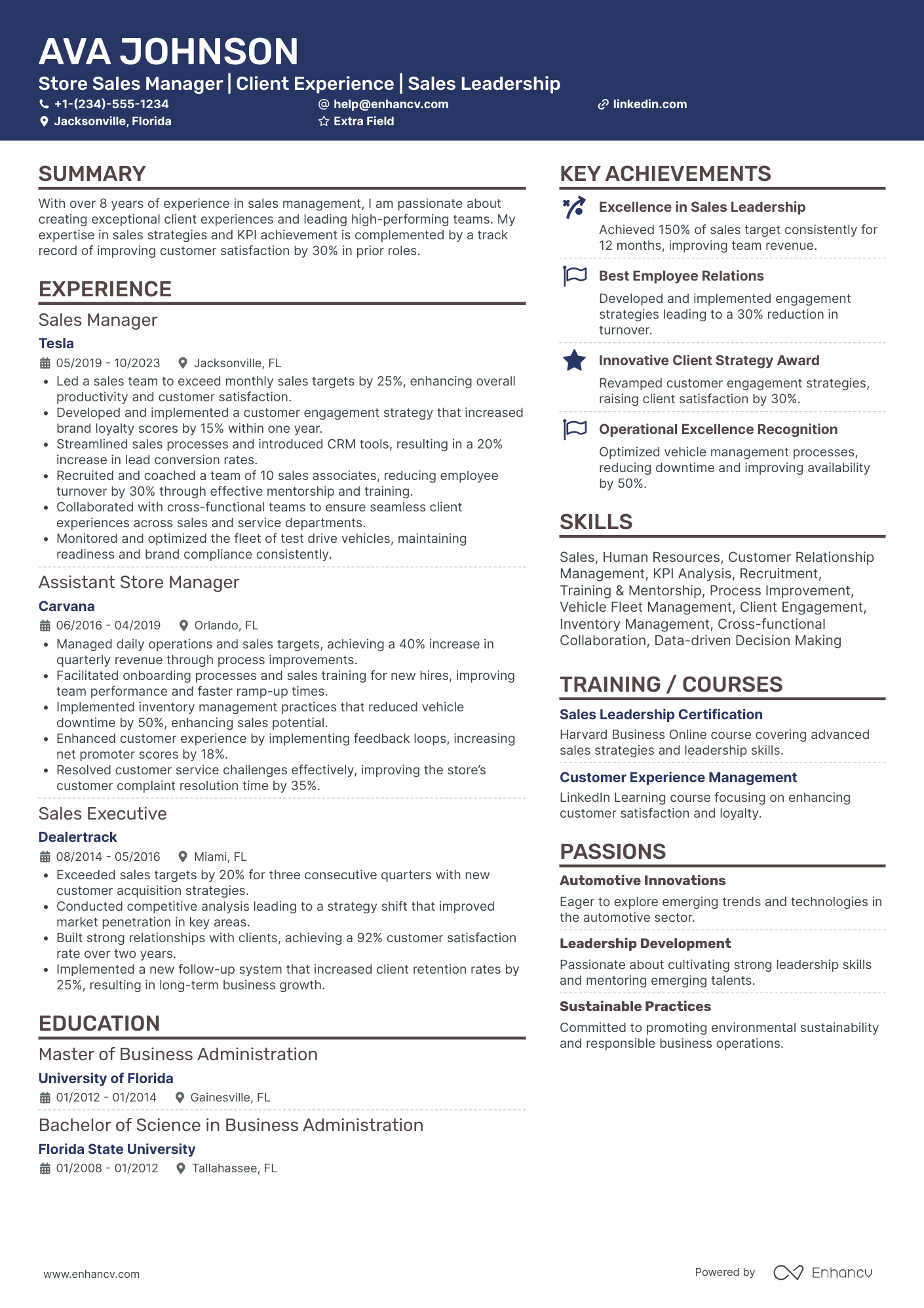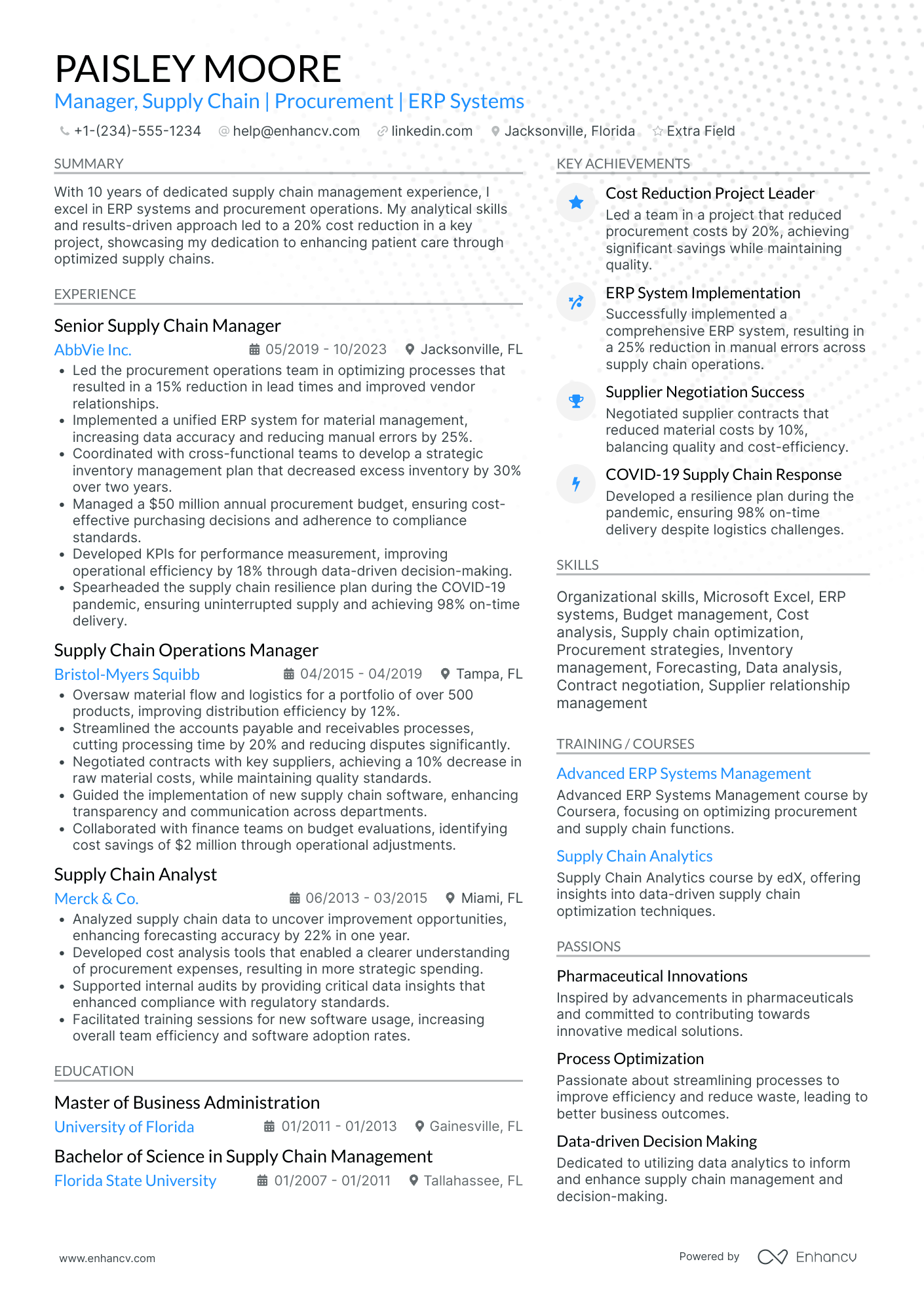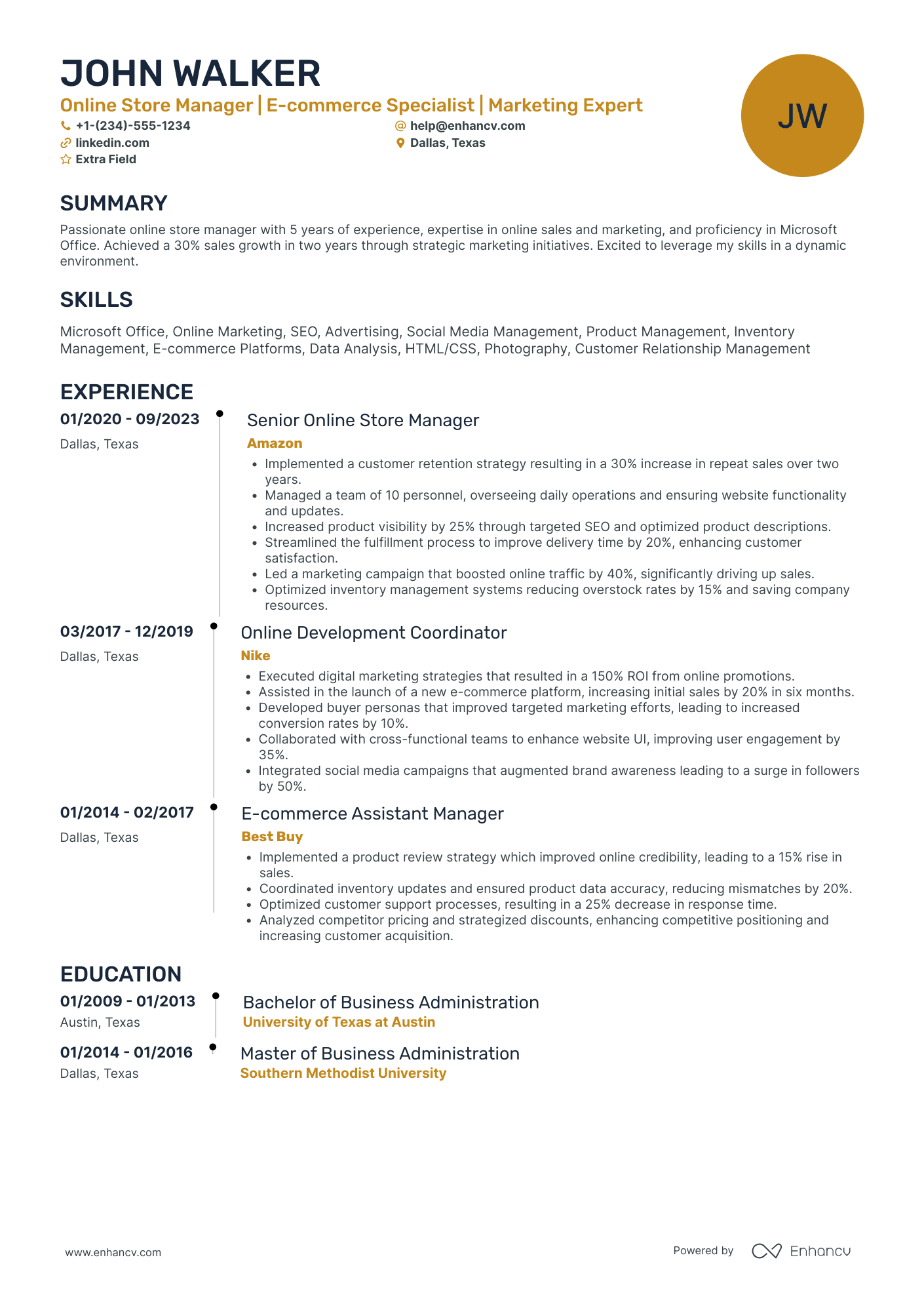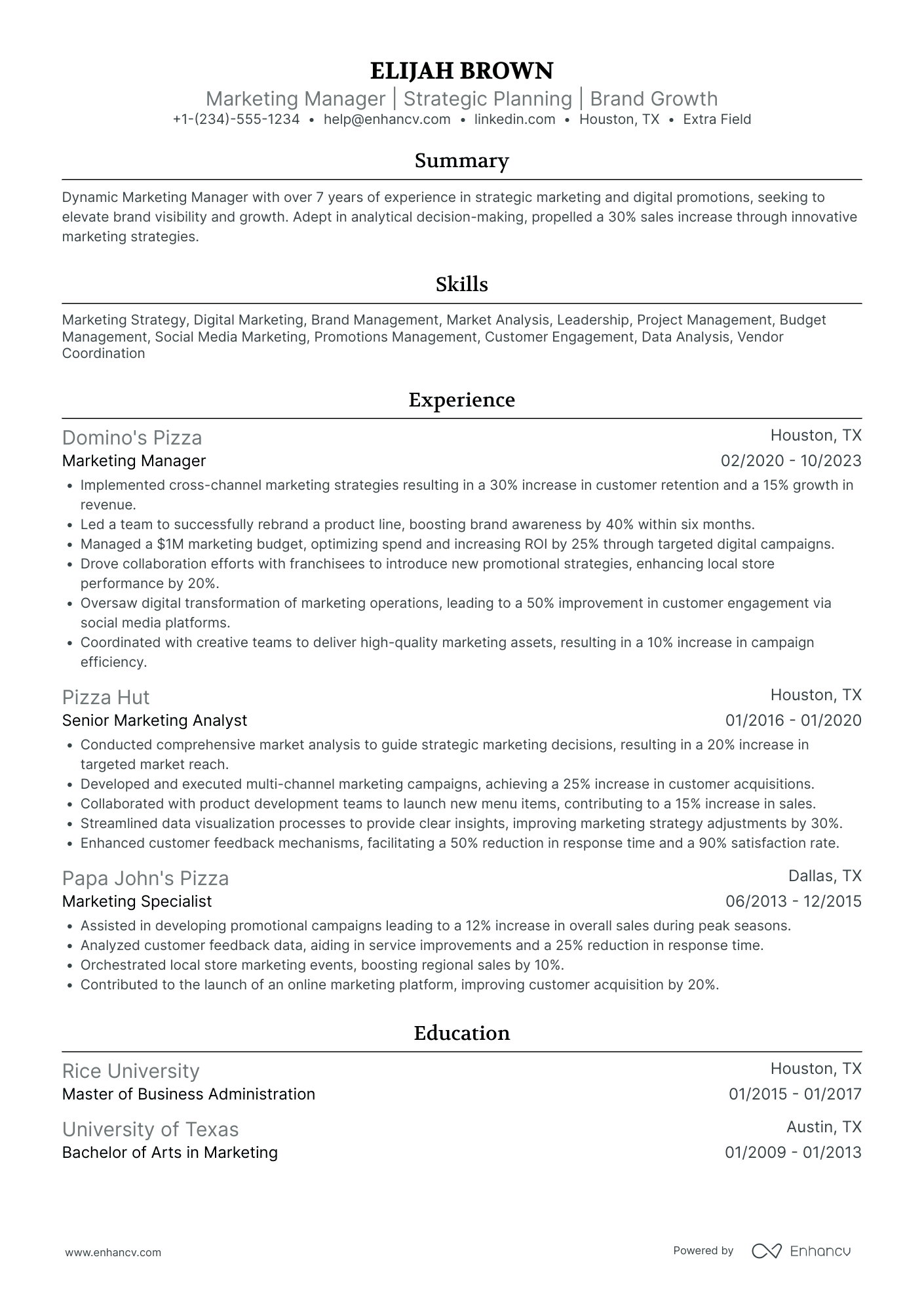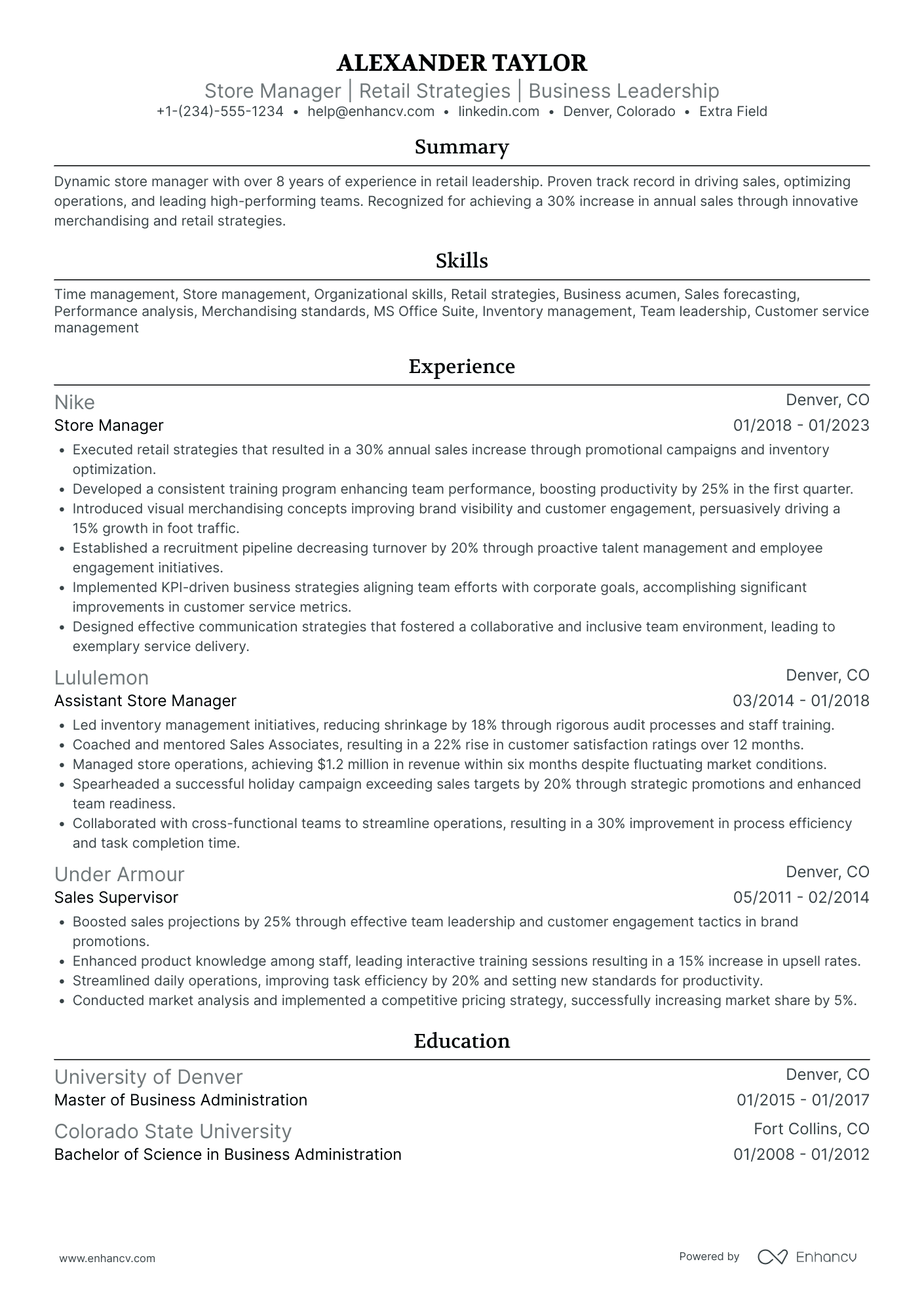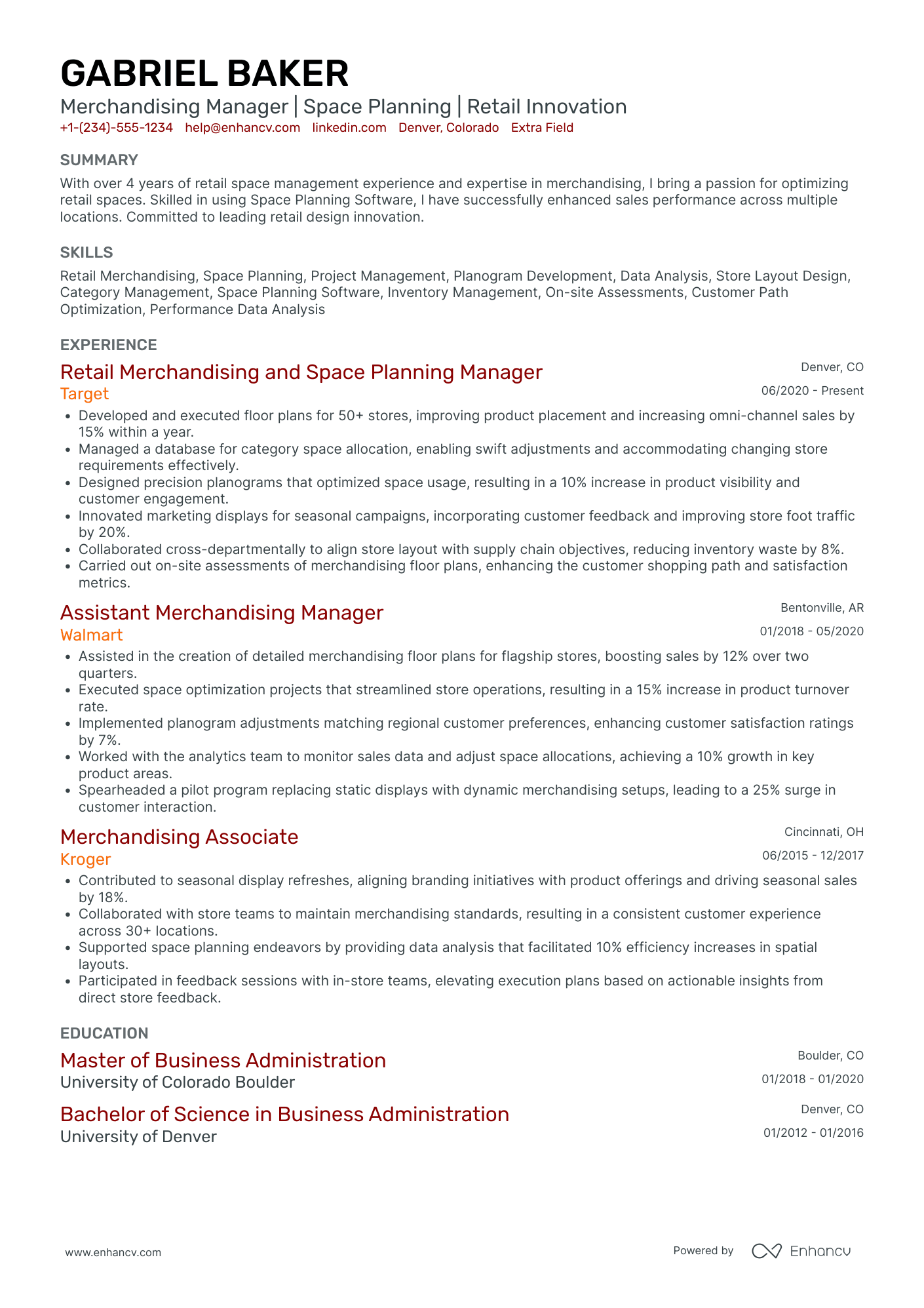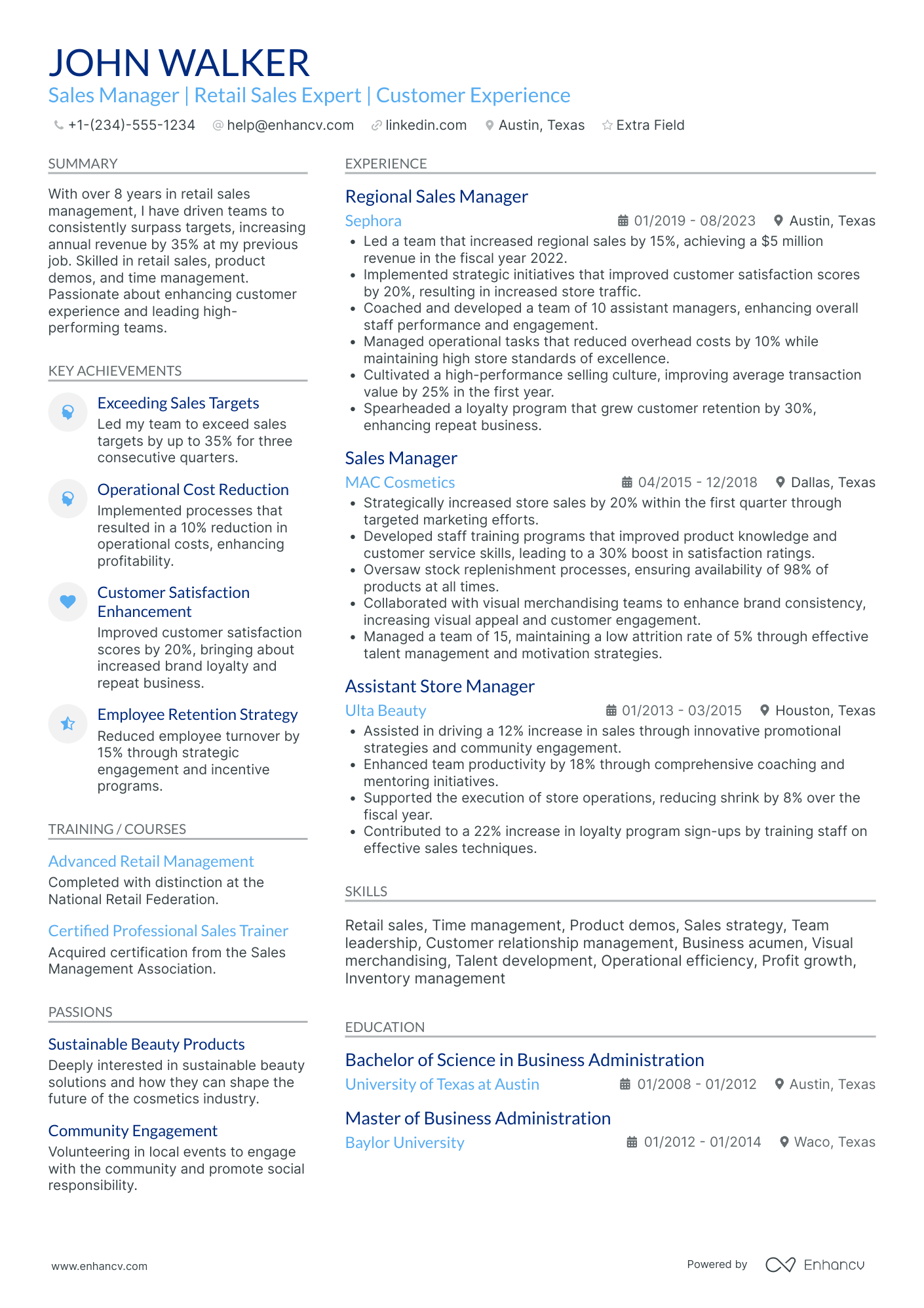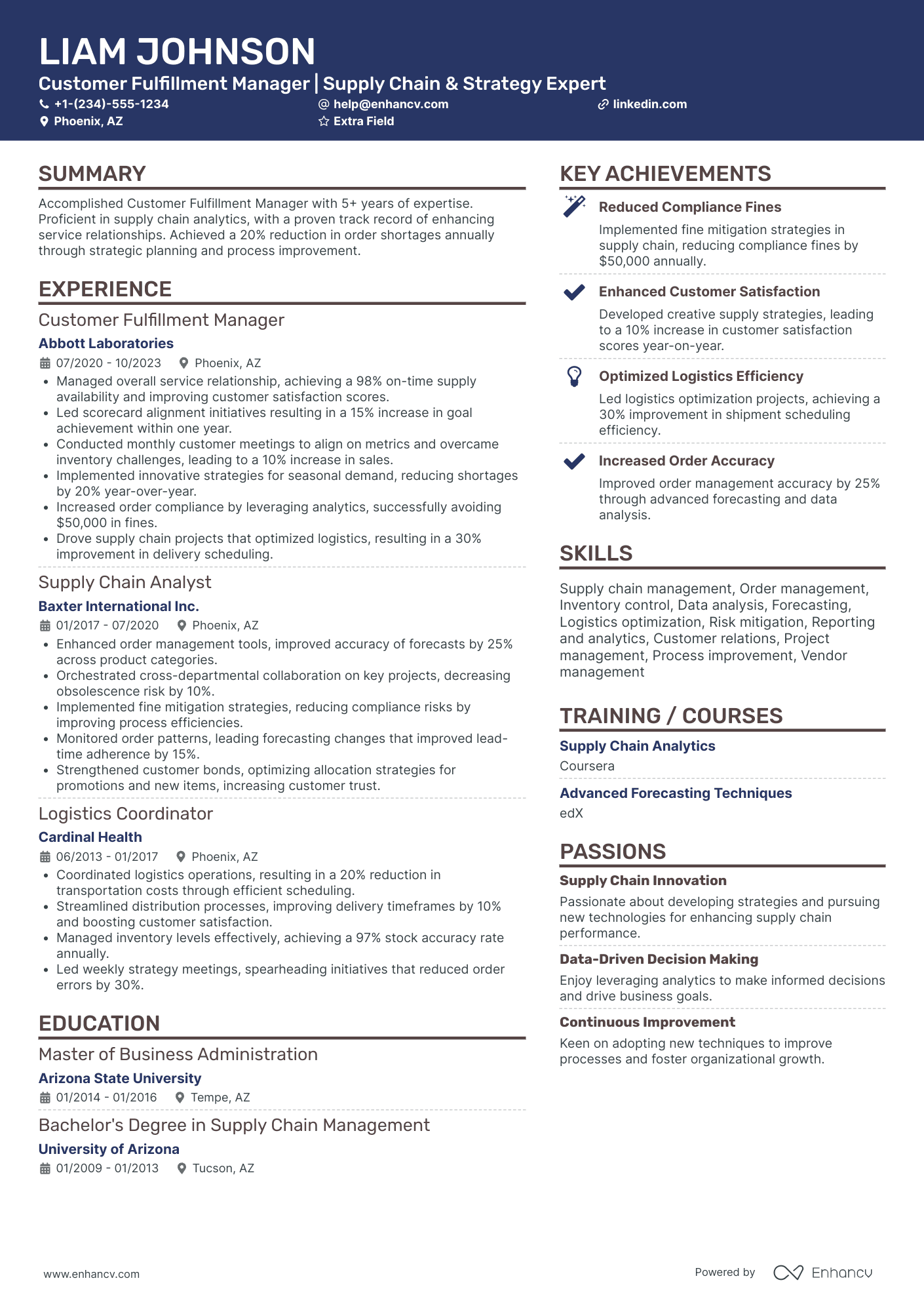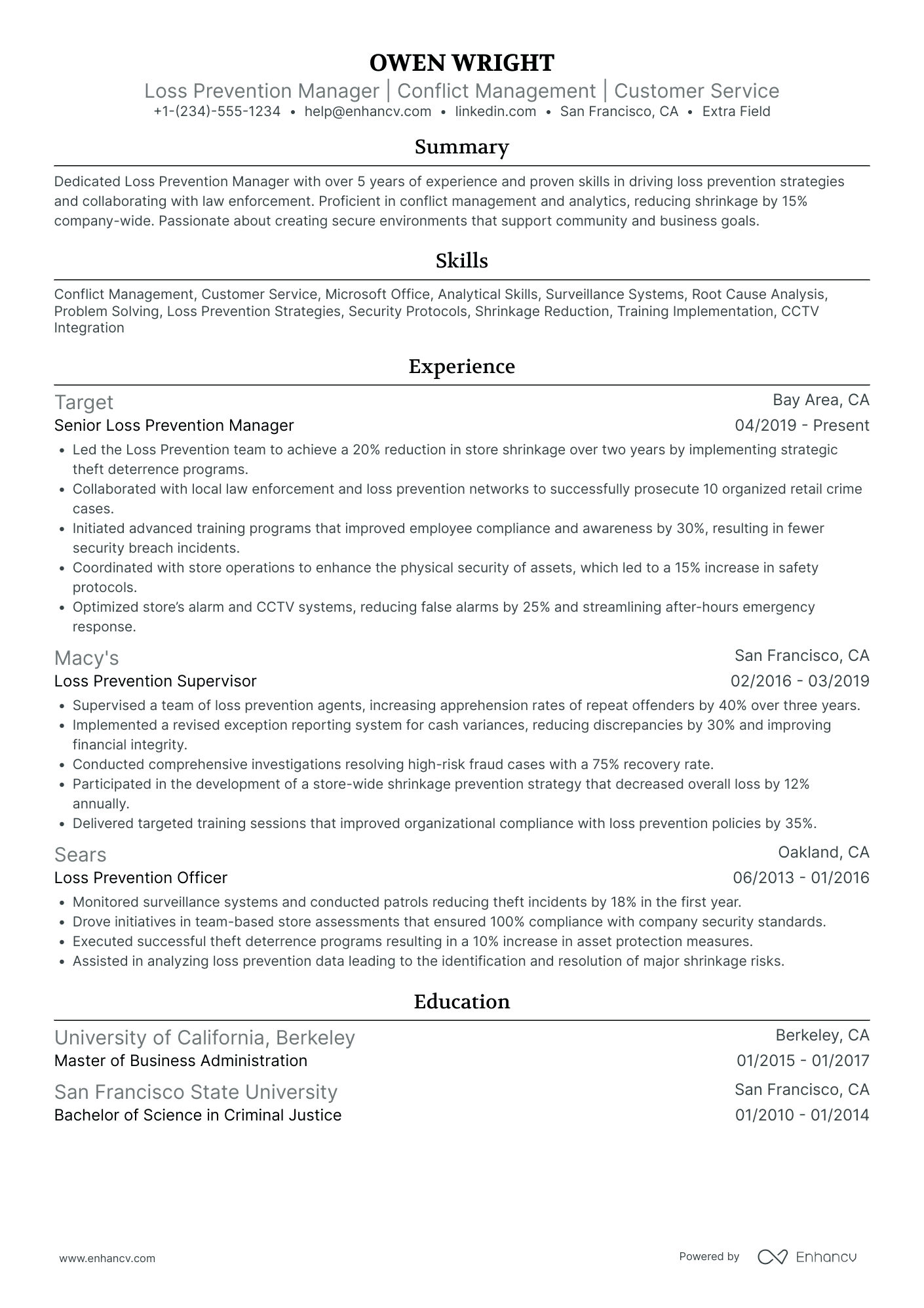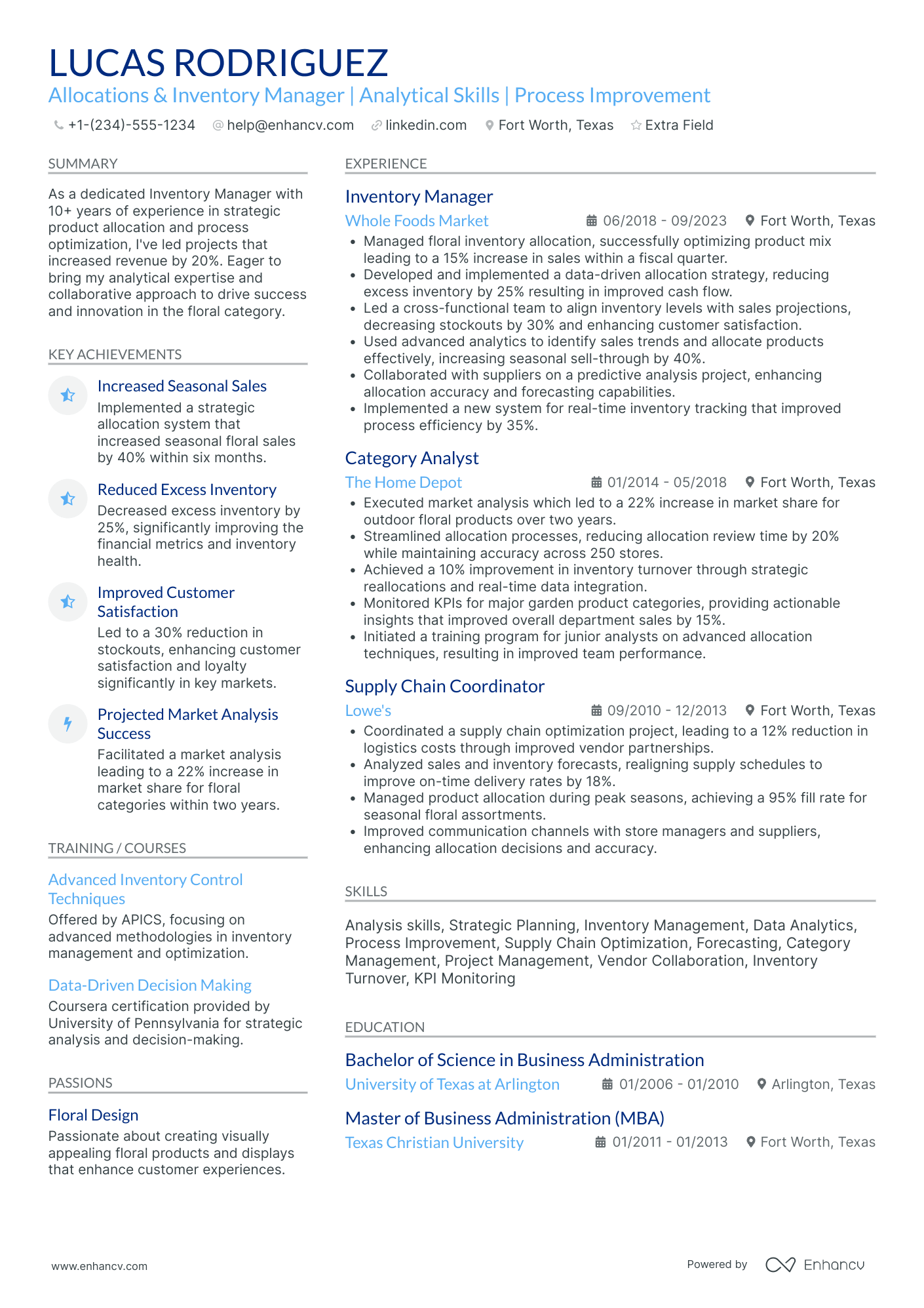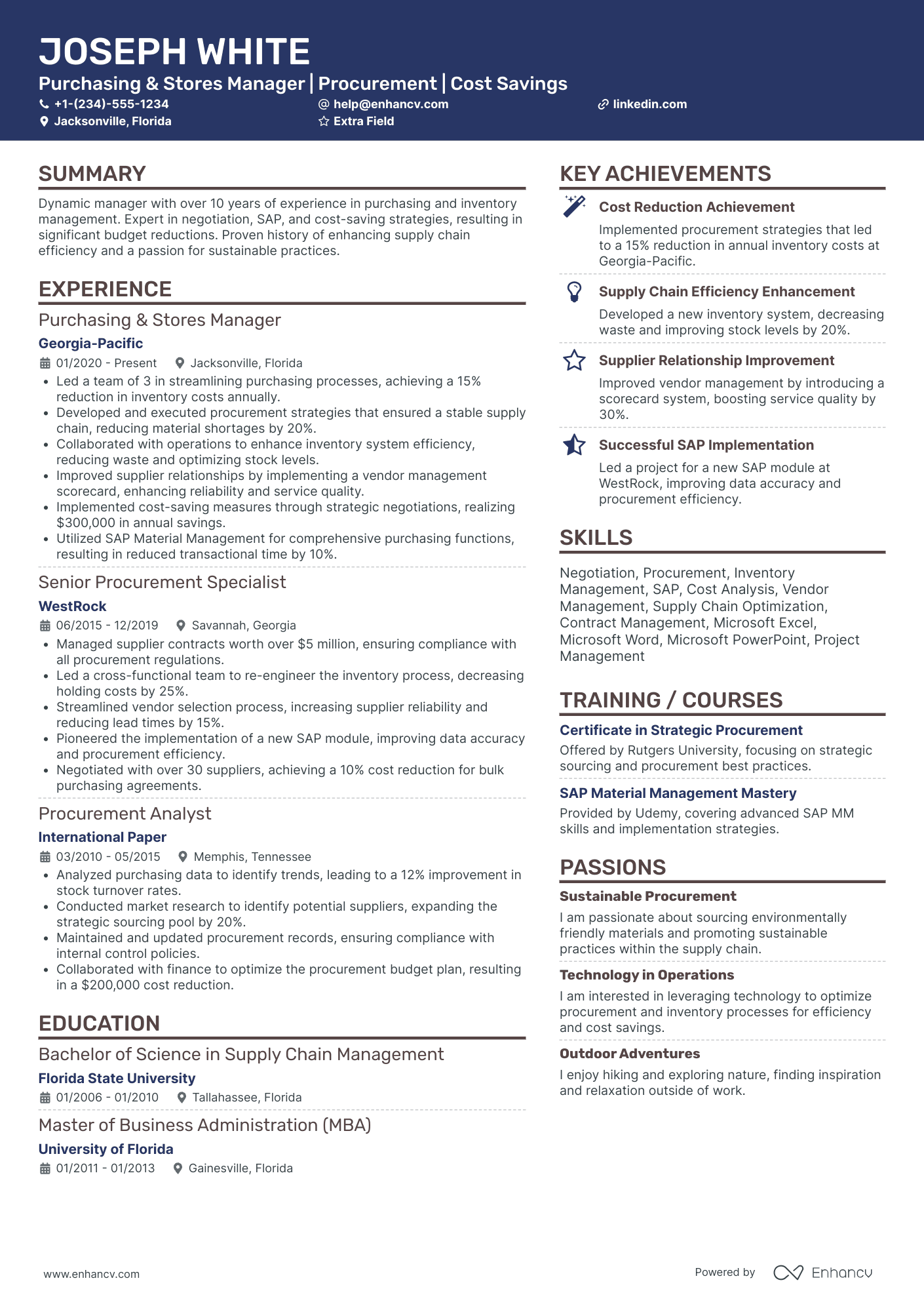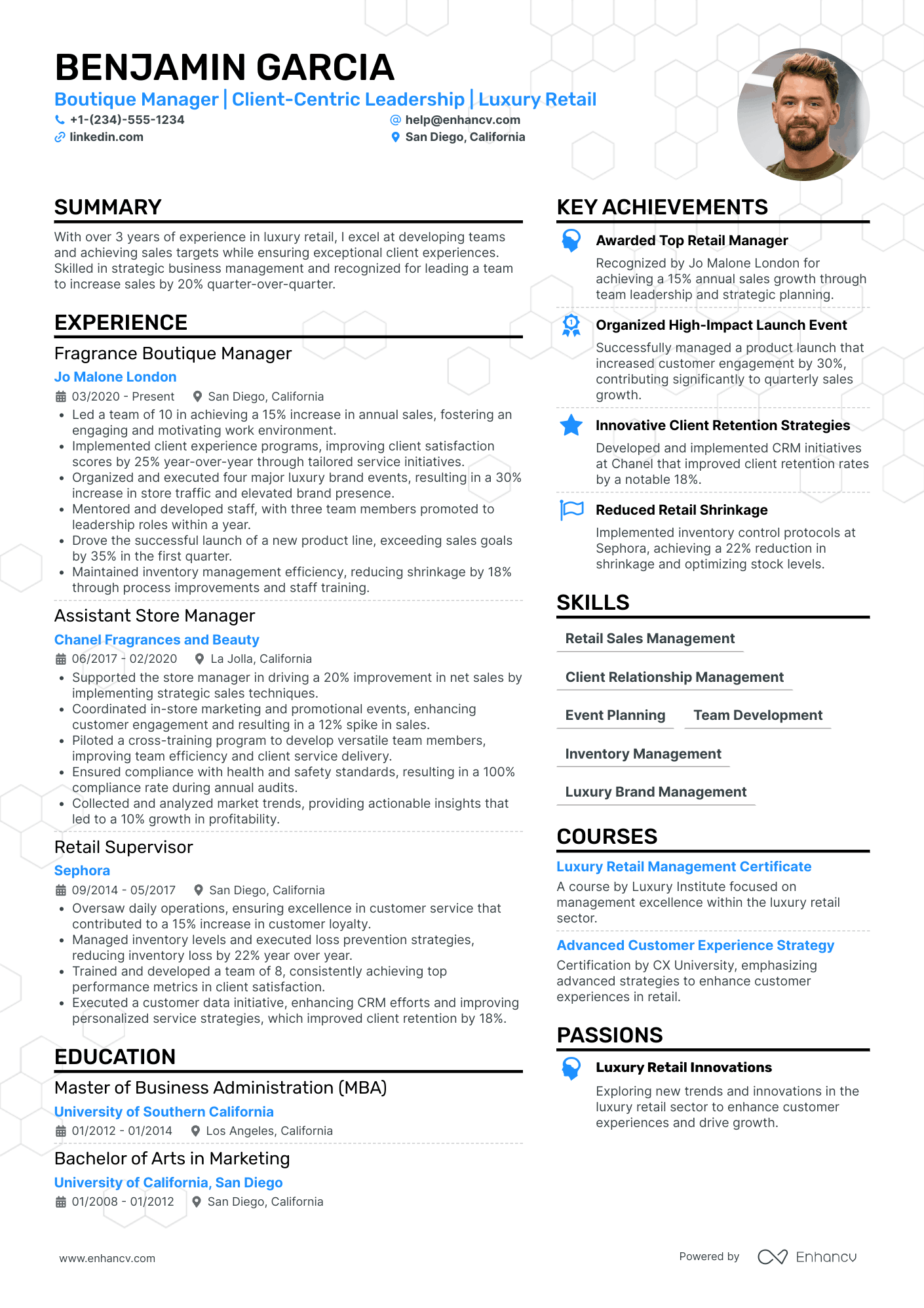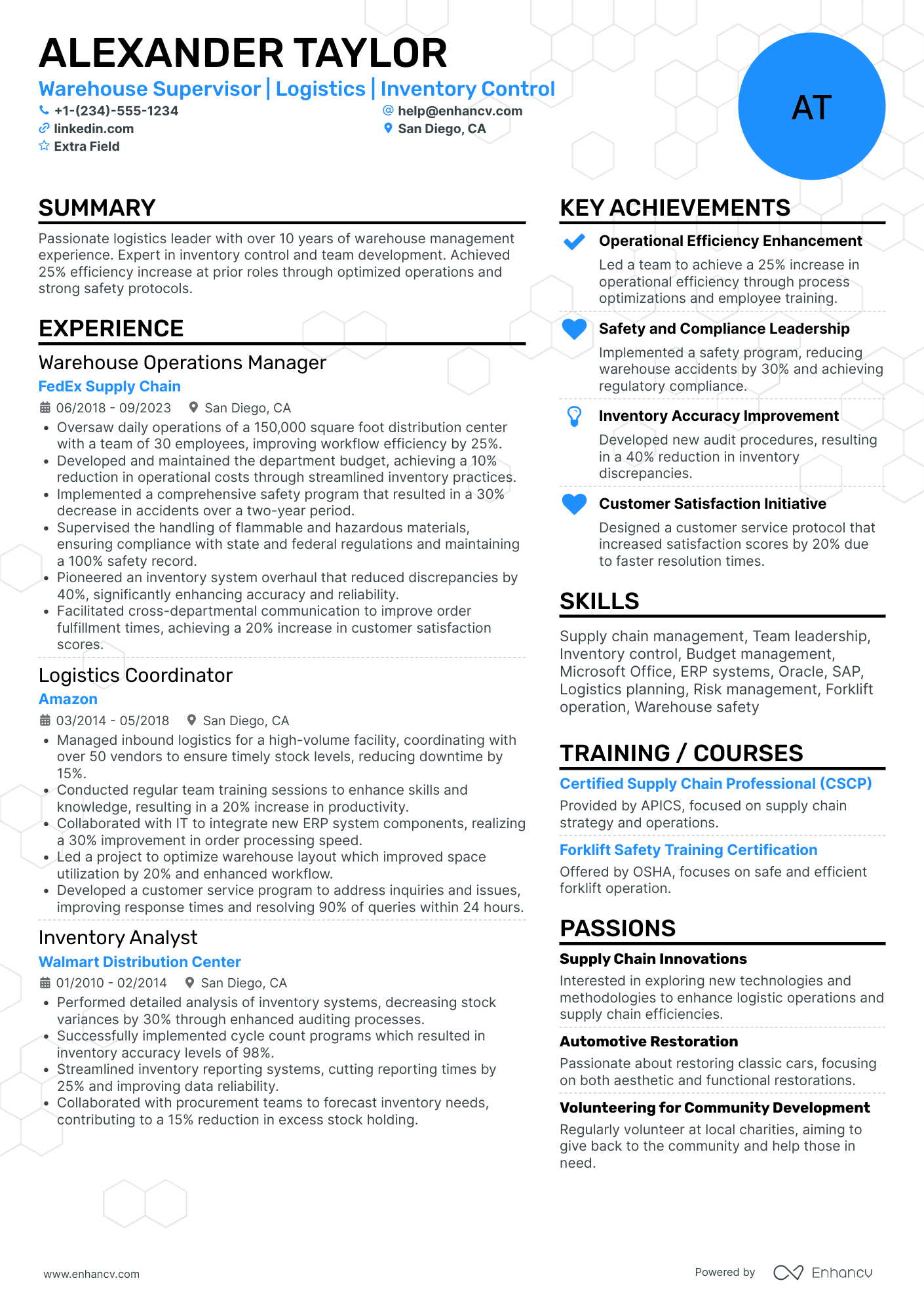Due to dynamic consumer behavior changes and economic factors, the retail sector continues to evolve. In fact, the changes are so rapid that store managers need to demonstrate their adaptability and up-to-date knowledge of industry trends above anything else. At the same time, the sector is extremely competitive, especially for positions with attractive benefits and in well-established companies. So, store managers need to find ways to distinguish themselves from a pool of candidates who may have similar experiences and qualifications.
Finding your way to recruiters’ hearts starts with a spotless resume and we’re here to provide you with the strategies to make your results-driven accomplishments stand out. This actionable store manager guide is set to teach you:
- Which resume format is most appropriate for your level of experience;
- How to weave in job description keywords without sounding fake;
- How to showcase that you go above and beyond for both your customers and your employees;
- Ways to flaunt your skills and support them with results.
- How to build your resume so that each section flows smoothly into the other in a convincing narrative;
- The top certificates to set you apart from the rest of the job candidates.
If you’re looking for other retail-related jobs, have a look at our range of options here.
- Cashier Resume
- Retail Resume
- Salesman Resume
- Sales Coordinator Resume
- Sales Associate Resume
- Retail Resume
- Store manager Cover Letter
Let’s dive in.
How to format a store manager resume
A big part of your job as a store manager is to sell products and services. This means you have to be able to pitch yourself on your resume too.
Start by defining the layout of your resume. Generally, you have three options to choose from:
- Reverse-chronological order: This is especially effective for store managers with a solid and progressive work history. It lists your work experience starting with your most recent job and working backwards. If you have a steady career progression and demonstrate consistent achievements in the retail sector, the reverse chronological resume is your best bet.
- Functional resume: store managers who are changing career paths, have gaps in their employment, or are early in their career might benefit from a functional resume. This layout focuses on skills and achievements rather than the chronological order of jobs.
- Combination (hybrid) resume: This format merges the best elements of both the reverse-chronological and functional formats. It allows store managers to showcase their most relevant skills and achievements up front, followed by a concise work history. It’s particularly useful for those looking to highlight specific aspects of their experience that are directly relevant to the job they're applying for.
When crafting a resume that emphasizes your strengths as a store manager, you need to communicate your personality and professional style. Balancing between style and simplicity can make your resume not just a document, but a testament to your brand.
Keep in mind the market you’re applying to – a Canadian resume, for instance, might have a unique layout.
Is your resume good enough?
Drop your resume here or choose a file. PDF & DOCX only. Max 2MB file size.
Here are some resume format tips that will improve your chances:
- Font: If you want to keep your resume design classic but also include a slight twist, slot in a customized font for your name and role. This helps to establish your personal brand, without overshadowing the content of the resume. For the body of the resume, choose professional, legible fonts like Arial, Calibri, or Times New Roman. Make sure it all remains easy to read, typically within the 10-12 point size range.
- Margins and layout: Set your margins to at least 1 inch on all sides. This ensures your resume appears organized and is easy to navigate.
- Resume header: A complete and accurately written header has your full name, contact information, location, and a link to your LinkedIn profile on it. Search the job description requirements to see if a resume photo is needed. While in the US you’re generally advised against it, your role involves a lot of face-to-face interaction, so a photo might still be required.
- Color and design: Opt for a resume design that uses color contrast effectively to draw attention without compromising ATS compatibility. A well-chosen design adds a personal touch and engages the reader. Avoid overly complex designs or cluttered layouts and leave ample white space between sections to enhance readability.
- File saving format: Save your resume as a PDF to preserve the formatting across different devices and operating systems. This ensures that the hiring manager sees your resume exactly as you intended, without any changes in layout or design that can occur with Word documents.
PRO TIP
Our resume checker can secure your resume's readability and save you considerable time. Do check it out.
Once you've settled on the format, the next step is to think about the content of the resume.
The top sections on a store manager's resume
- Work experience: Showcases your retail management journey.
- Key achievements: Highlights significant contributions and successes.
- Skills section: Demonstrates your capabilities in leadership and sales.
- Education and certifications: Shows your foundational knowledge and expertise.
- Customer service excellence: reflects your dedication to customer satisfaction.
If you’re wondering why we focus on these sections, there are a few points you need to take into account. The main one is, of course, your audience—the hiring manager reading your resume.
What recruiters want to see on your resume
- Leadership experience: Recruiters value a proven ability to lead and motivate a team towards achieving sales and operational goals.
- Profit and loss management: Demonstrates your capacity to oversee budgeting, control expenses, and drive profitability.
- Customer service skills: Essential for ensuring high levels of customer satisfaction and building customer loyalty.
- Inventory control expertise: Shows the ability to manage stock levels, reducing loss and maximizing sales.
- Adaptability to change: Important in the fast-paced retail environment where market trends and consumer demands constantly evolve.
Let’s see how it’s done in the largest part of your resume—the experience section.
How to write your store manager resume experience
Creating your experience section is a big part of showcasing your managerial skills, achievements, and the value you can bring to a new role. Here are some steps and tips to help you craft an effective experience section:
- Start with the basics: For each position you've held, include your job title, the company's name, location, and the dates of employment. List these in reverse chronological order, starting with your most recent job at the top.
- Highlight your responsibilities: provide a bullet-point list of your key responsibilities. Focus on those that are most relevant to the store manager position you're applying for. Use action verbs to start each bullet point, such as "managed," "coordinated," "developed," "implemented," or "oversaw."
- Quantify your achievements: Whenever possible, quantify your accomplishments with numbers, percentages, or tangible outcomes. For example, "Increased quarterly sales by 15% through strategic marketing campaigns and customer engagement initiatives.”
- Tailor your experience: Customize the experience section to the job you're applying for by emphasizing the skills and experiences that align with the job description. Highlight your expertise in areas such as customer service, inventory management, staff training, financial management, and sales strategy.
- Use keywords: Incorporate keywords from the job listing into your resume. Using the same language as the job ad can help ensure your resume gets noticed.
Let’s have a look at how it’s done with a bad and a good example.
- •Managed inventory.
- •Helped with marketing.
- •Created visual displays.
- •Followed the latest trends by attending LAFW.
If we go back to the steps above, we’ll see that this experience description fails on many levels. It’s far from compelling and there is a noticeable absence of action verbs and significant accomplishments. A very bland and unmotivated writing approach indeed.
- •Reduced shrinkage by 55% by introducing rigorous inventory management processes.
- •Exceeded quarterly revenue target goals by creating engaging visual displays outside the holiday shopping season.
- •Assisted in selecting looks from LAFW to later sell at the store, which led to a 27% increase in customers.
- •Mentored and supported staff who were later promoted to store manager positions at different locations.
What a difference! Here’s why this version is effective:
- Quantifies аchievements: Each bullet point includes specific percentages to quantify the manager's achievements. This demonstrates the tangible impact the manager had on the store's performance.
- Demonstrates a range of skills: The section showcases a variety of skills and responsibilities, from inventory management and visual merchandising to team leadership and staff development.
- Highlights strategic initiatives: The manager's actions, such as introducing new inventory processes and selecting merchandise from LAFW, show strategic thinking and initiative beyond routine tasks.
- Illustrates leadership and development: By mentioning the mentoring and support of staff who were promoted to store manager positions, the section underscores the manager's leadership and ability to develop talent within the team. This indicates a commitment to team growth and success, which is critical for the role of a store manager.
Now, let’s take a deeper look at some more ways to quantify your successes on a resume.
How to quantify impact on your resume
Below is a list of some effective ways to convince prospective employers that you’re the right fit for the job.
- Include the percentage increase in store sales under your management to show revenue growth.
- Detail the reduction percentage in employee turnover rates to highlight improved staff retention.
- Mention the exact number of new customer loyalty program sign-ups to demonstrate customer engagement success.
- State the dollar amount of cost savings achieved through inventory management improvements to illustrate financial acumen.
- Quantify the expansion in product lines or categories introduced, showing innovation and market adaptation.
- Report the increase in average transaction value to indicate enhanced sales strategies.
- List the specific number of training sessions conducted to showcase commitment to team development.
- Provide the percentage decrease in operational costs due to efficiency initiatives, reflecting your ability to optimize expenses.
If you manage to combine some of these strategies with job-relevant skills and keywords, you’re almost guaranteed an interview invite. Just remember, don’t lie on your resume. Only include experiences you’re genuinely familiar with.
How do I write a store manager resume with no direct experience
Naturally, on a resume for store managers, you should indicate how you’re equally involved with staff and customers. This is easier for senior-level store managers because, with lots of experience, they can pick and choose what and how to emphasize on their resume.
However, entry-level professionals and college grads need to be more creative. Here are a few suggestions for building a resume with no work experience:
- Use the hybrid resume format: You won’t have to list unrelated employment history just to fill out the page. Instead, you’ll be able to focus on your skills and internship experience if you have any.
- Create a strong resume objective: Objective statements are short statements showing how your professional goals align with those of the target company. It’s perfect for first-time job seekers or people changing careers.
- Include transferable skills: List relevant abilities that prepare you for store management. Focus on customer service, leadership, communication, problem-solving, and basic financial management. Also, mention any proficiency in retail software or technology.
- Prioritize education: As entry-level candidates might not have extensive work experience, emphasizing your education is vital. Include your degree, major, and any relevant coursework or projects, especially those demonstrating leadership or business management skills.
- Add extracurricular activities: Including volunteer positions or involvement in school clubs and organizations can be very beneficial. Highlight any leadership roles or projects that showcase your ability to work in a team, lead initiatives, or manage events.
- Certifications and training: If you have any relevant certificates, add them to your experience section. Even if you lack practice, you show you have set the foundation you wish to build upon.
The following sections of the guide will help you get a better understanding of the right way to create a resume. Onto the skills section.
How to list your hard and soft skills on a resume
Effective skills showcase your capabilities and expertise critical for success in the role. This section should be a concise yet powerful summary of your managerial, operational, and interpersonal skills.
We advise you to create a dedicated section to your hard skills (those you acquire through education and training) and software proficiency so that recruiters can spot them immediately.
Best hard skills for your store manager resume
- Inventory management software proficiency
- Point of Sale (POS) systems operation
- Financial reporting and budgeting
- Retail analytics and sales forecasting
- Loss prevention techniques
- Supply chain and vendor management
- E-commerce platform management
- Customer relationship management (CRM) software
- Merchandising and product placement strategies
- Employee scheduling software
- Health and safety protocols in retail
- Microsoft Office Suite (Excel, Word, PowerPoint)
- Mobile payment technology expertise
- Online marketing tools and SEO principles
- Data analysis and interpretation
- Visual merchandising tools
- RFID technology for inventory tracking
- Workplace communication platforms (e.g., Slack, Microsoft Teams)
Store managers also need strong leadership and problem-solving abilities. When it comes to such interpersonal skills, however, it’s best to include examples of how you led a team to achieve a goal or resolve conflicts in different resume sections. The reason is that soft skills are more credible when quantified or proven. For example, instead of simply listing “crisis management”, incorporate it in one of your experience section entries—”Successfully navigated the store through an unexpected, week-long power outage, implementing rapid response strategies that minimized inventory loss by 75%”.
Best soft skills to showcase on a store manager resume
- Leadership and team management
- Customer service excellence
- Communication and interpersonal skills
- Problem-solving and decision-making
- Adaptability and flexibility
- Time management and prioritization
- Conflict resolution
- Motivational and coaching skills
- Strategic thinking and planning
- Attention to detail
- Creativity and innovation
- Empathy and emotional intelligence
- Stress tolerance and resilience
- Negotiation skills
- Cultural awareness and sensitivity
- Ethical judgment and integrity
- Persuasion and sales skills
- Collaboration and teamwork
Remember to tailor this section to match the job description. This will significantly enhance your resume's impact, making it evident to employers why you're the ideal candidate. Specificity and relevance are key to making your skills section stand out.
How to list education and certifications on your resume
The education section is an important part of a resume for store managers, though its weight may vary depending on the specific role and employer.
For entry-level management positions, education can be a decisive factor. It demonstrates a foundational knowledge of business practices, management principles, and other relevant skills.
For higher-level positions or in companies that value experience over formal education, extensive work history and practical achievements may take precedence. However, including education can still add value by showcasing a commitment to learning and personal development.
Here’s how you write about education on a resume:
- Start with your degree, followed by your major
- State the institution where you obtained your degree
- Include the start and end dates of your degree program, or just the year of graduation.
- Optional: highlight any significant achievements related to your academic career (honors, awards, etc.)
- Optional: add your GPA score if it’s above 3.5
Additionally, certain certifications relevant to retail or management can significantly enhance your appeal by highlighting specialized skills and knowledge.
Best certifications for your store manager resume
As with anything else on your resume, make sure you only list certificates that are relevant to the job you’re applying for.
Now, let’s proceed to the most powerful part of a resume—the summary statement.
How to write your store manager resume summary
A strong summary is crucial for a store manager's resume as it captures the essence of your experience, skills, and achievements in just 3-5 sentences. This section helps to make a compelling first impression, setting the tone for the rest of your resume. It’s best to write it last so as to better communicate your value proposition to potential employers.
When crafting your summary, employ the time-tested strategy of tailoring your language to mirror the job description's keywords. Highlight your top skills and previous accomplishments, and conclude by expressing your eagerness to contribute to the success of the prospective company. A final piece of advice: steer clear of personal pronouns, adhering to industry norms for a polished and professional tone.
Let’s compare two examples.
The first draft doesn’t look very promising. What’s wrong with it?
- Too much character description and not enough results.
- The candidate hasn’t listed any relevant experience, education, or certifications.
- No specific techniques or rates are mentioned.
Onto the improved version:
Who wouldn’t want to hire an expert with more than a decade of experience? Especially if they orchestrated the addition of 3 store locations. On top of this, the candidate has included crucial facts about revenue and staff management. Finally, they detail how they achieved a 75% boost in customer satisfaction, proving a results-oriented mindset.
Additional sections for a store manager's resume
Some additional sections on a store manager's resume can provide a more comprehensive view of your capabilities and achievements. Consider these options to enhance your resume:
- Professional achievements: You can dedicate a separate section to highlight specific accomplishments in your career, such as sales milestones, awards, or recognition you've received for your work. This can include any notable projects you've led or contributions to profit growth and customer satisfaction.
- Languages: Fluency in additional languages can be a significant asset in diverse retail environments, demonstrating your ability to communicate with a broader customer base and manage a multicultural team.
- Interests: While not always necessary, including a brief section on relevant personal interests can help humanize your resume and potentially create a connection with the hiring manager, especially if you’re at the start of your career journey. Be sure to only include interests that might be seen as adding value to your role as a store manager.
Below is an example of how your hobbies/passions may look:
Adding any of these sections thoughtfully can make your resume stand out, providing a fuller picture of who you are as a professional and what you bring to the table.
Key takeaways
In wrapping up our guide for crafting an outstanding store manager resume, let's focus on how you can fine-tune your document to ensure it stands out in the competitive retail landscape.
- Decide on a resume format depending on your level of experience. The reverse-chronological order is best suited for experienced candidates.
- Make your resume more ATS-friendly by using simple, readable fonts and leaving ample white space.
- Use keywords from the job description strategically by incorporating them within the different resume sections.
- Write impactful descriptions of your store management experience, including concrete results.
- Build an effective resume summary (or objective statement for junior roles) to impress recruiters from the start.
- Consider including optional sections to add more value to your experience.
Store Manager resume examples
By Experience
Senior Store Manager
Junior Store Manager
By Role
Assistant Store Manager
The role of the Assistant Store Manager sprouted from the retail industry, influencing the evolution of store management as a whole.
To increase your chances of landing an Assistant Store Manager position, consider these tips:
- Prior management experience is key. Whether it's in supply chain, stock inventory, or sales, highlight these on your resume. Both retail-specific and general management skills are valued.
- Emphasize your leadership skills. As an Assistant Store Manager, you'll oversee staff and operations. Showcase any instances where you've led a team to success.
- Highlight any retail-specific experience. Understanding how to engage with customers or manage floor operations will set your application apart.
- Instead of just listing skills, illustrate how they drove success. For example, prevent stock shortage by improving inventory management, or boosted sales through employee training. Follow the “skill-action-results” structure for added impact. This practical approach shows employers you can directly contribute to their bottom line.
Clothing Store
Like the product management field primarily originating from software development, the role of a store manager in a clothing store had its roots in retail sales. This is why the trends in the retail universe significantly influence the development of management tasks in apparel stores.
Consider the following tips when applying for a managerial job in a clothing store:
- Formal sales training and experience are crucial. Having experience in visual merchandising, inventory management, or customer service can be a deciding factor. Include details of your roles, responsibilities, and the results you achieved.
- Highlight any experience you have in fashion or apparel retailing. Make sure to mention your familiarity with trends, styles, and industry-specific terminology.
- Don’t just list your skills - demonstrate how they contributed to sales growth or customer satisfaction. For instance, discuss how your display tactics improved sales, or how your superior customer service skills reduced returns.
These tips will help you tailor a winning clothing store manager resume.
Convenience Store Manager
When applying for a Convenience Store Manager role, keep in mind that quick service is paramount. Use these tips for your resume:
- Highlight previous experience in fast-paced retail environments, as convenience store customers value quick, efficient service.
- Show familiarity with store display planning and inventory management.
- Demonstrate your ability to work flexible hours, as convenience stores often have long hours, and even remain open 24/7.
- Remember to follow the 'skill-action-results' pattern when elucidating your skills for more impact on your application.
CVS Store Manager
While applying for a CVS Store Manager position, focus on your familiarity with healthcare products. Use the following tips to highlight your skills:
- Demonstrate in-depth knowledge of healthcare and beauty products since CVS is primarily a pharmacy.
- Show the ability to comply with healthcare regulations.
- Highlight your customer service and leadership skills, as a large part of the role will involve managing a team and ensuring high customer satisfaction.
- Adhere to the 'skill-action-results' pattern for showcasing your skills.
Grocery Store Manager
Focus on detailing your expertise in food products and retail management for a Grocery Store Manager position:
- List your experience with perishable goods and inventory rotation to prevent loss due to spoilage.
- Emphasize experience with grocery-specific point-of-sale systems.
- Highlight your ability to manage a large team, addressing scheduling, disputes, and performance review.
- Don't forget the 'skill-action-results' pattern for listing your skills.
Liquor Store Manager
For the role of Liquor Store Manager, knowledge of alcohol products and regulations become crucial. Here are some tips:
- Highlight your expertise about various types of alcohol, which can help with product recommendations and customer service.
- Demonstrate familiarity with age verification protocols and liquor laws.
- Make leadership skills a focal point, as they will help with staff training and ensuring legal compliance.
- Follow the 'skill-action-results' pattern for effective skill demonstration.
Starbucks Store Manager
A Starbucks Store Manager requires specific skills pertinent to the coffee business. Use these tips to strengthen your resume:
- Show expertise in coffee, from different roasts to the art of brewing.
- Showcase your people skills, a necessity in Starbucks' customer-focused culture.
- Highlight your ability to train new hires, uphold company standards, and manage a fast-paced environment.
- Stick to the 'skill-action-results' formula for best results.
Department Store Manager
Retail Store Manager
Store Operations Manager
Store Sales Manager
Store Supply Chain Manager
Online Store Manager
Store Marketing Manager
Warehouse Store Manager
Fashion Store Manager
Store Merchandising Manager
Multi-Store Manager
Store Customer Service Manager
Store Loss Prevention Manager
Store Inventory Manager
Store Purchasing Manager
Boutique Store Manager
- Structured and Concise Presentation - The resume is organized clearly with distinct sections for experience, education, skills, and achievements, which enables easy navigation. Each section is concise yet informative, ensuring the reader can quickly assess Benjamin Garcia's qualifications and career accomplishments.
- Dynamic Career Growth in Luxury Retail - Benjamin's career trajectory reveals a clear progression within the luxury retail sector. Starting as a Retail Supervisor at Sephora and advancing to a Boutique Manager at Jo Malone London, it showcases sustained professional growth and increasing responsibilities.
- Emphasis on Leadership and Client Relations - Throughout the document, there is a strong focus on leadership and client-centric initiatives. This is evidenced by achievements in team development, strategic planning, and enhancing client experiences, underscoring Benjamin's adeptness at fostering high-performing retail environments.
